#jaehaerys and alysanne
Text
“Quick” Note on Alysanne and her Children *EDITED*
Growing up and raising children more and more within the confines of the castle and royal court, where the customs would be observed and practiced more, Alysanne also grew to mentally and habitually adopt ideas and behaviors more than before Jaehaerys took the throne back.
Because Alysanne did seem to have terrible relationships with her daughters while expressing dread with a few’s willfulness (the post I’m responding to):
Viserra: Alysanne not liking that she actively tried to pursue Baelon to become Queen, and Viserra not wanting the marriage with Manderly but being betrothed forcefully anyway without so much as a real conversation
her & Jaehaerys being responsible for Daella’s wanting to marry a too-old man over an Old-Gods worshipper like Royce Blackwood who was closer in age -- religious/extra-patriarchal/Faith-based parenting from the more submissive Alyssa Velaryon (*EDIT*we also have to note that ALysanne didn’t want to marry Daella off so young and later would rail against Jaehaerys for forcing i anyway, which he did by declaring Daella must be married or be forced into a nun’s life)
Maegelle turning out better and the “lucky” one, but still heavily influenced into not really seeing the rift between Alysanne and Jaehaerys as indicative of something greater than just disagreement
Saera, her whole life being compared to the dead and “unmanageable” Aerea and ending up (at first) in danger in the sex trade of Essos
Alyssa being allowed to be pregnant too young or not allowed to take breaks to heal/build up strength and Alysanne thinking more for Baelon than her, even with her mentioning how Alyssa followed Baelon around -- again, pattern of Targ women/wives of Targs giving birth to many children too frequently (Alyssa V, Alysanne, Alyssa T!)
Gael not being allowed to really grow on her own away from Alysanne because Alysanne sought her as an emotional crutch, thus Gael not having enough inner strength, self esteem, or perception to survive after her lover seduces and leaves her
And the fact that Jaehaerys thought to allow their daughters to have any sort of political/military education or training as Visenya and Rhaenys surely did, which I suspect Alysanne doesn't fight harder for because she already doesn't have much political power compared to Visenya and Rhaenys.
Alysanne constantly compares Saera to Aerea, as if it were a bad thing. Implying that Saera was too "willful" and hard to manage...which admittedly shows that Alysanne still has this bit of prejudice (and internalized misogyny) towards women and girls who display noncompliance and nonquietness despite her castigating Rhaena for disparaging the absent Aerea and her taking out Balerion and running away...Alysanne saying that Aerea was "just a child" to Rhaena's "what kind of monster" she brought to life who would take the dragon who killed her father (Aegon the Uncrowned) of all the dragons she could have claimed. A frustrated rage of a person who didn’t get to really raise her own daughters for the sake of their survival but never bonded with them properly afterward.
All because she seemed to know that Jaehaerys would not accommodate such a personality or expressiveness for power from his daughters. By how he treats Rhaena, knowing that she has some claim by being the eldest, he purposefully made her display her submission to him before he have her Dragonstone to live in. Even though she already supported his coming into power without asking for anything else. All of which shows Jaehaerys' anxiety of female power and leadership, even that coming from his daughters.
Then there is the fact she didn’t do anything more to make Jaehaerys reconsider not killing Braxton Beesbury right in front of their daughter even after she escaped the first time...because her escaping shouldn’t preclude trying to save her from emotional trauma like that and Saera really didn’t deserve being isolated and pusnished as she was for sleeping with different men at once. We just brushed right past her hurting Tom turnip, her bullying Daella like these were nothing and focused on her sleeping with other boys for attention and feelings of control...sure. Again, because Jaehaerys -- being the final authority AND having a stubborn streak when it came to male exclusive power -- she concedes to get some lesser form of power for herself and that of her kids -- what happens with Daella. So what happens to their kids are both her and J's faults, but it seems from the sociopolitical power that J has over his relatives, his ability to use it against them, and his willingness to do so for his own benefit, that it is mostly J's fault.
He has made the environment where everything hinged on his determination of whether or not the new "problem" would endanger his image and authority. And Alysanne was the responder, the victim, as well as the perpetuator.
It looks like Alysanne also inherited troubles with daughters that she rebuked and blamed Rhaena for. More than Rhaena does Aerea, though Alysanne abjects Saera into a monstrous feminine figure all throughout her childhood (while Rhaena's treatment of Aerea is arguably more sympathetic since Rhaena's *trauma* at Mageor's hands and her separation from her daughter, her daughter growing apart from her in that separation. A separation where they both lived conscious lives apart and long enough for them to be near strangers to each other).
How did Alysanne go from defending Aerea to her mother for claiming a dragon and running away to calling Saera Aerea-like with anxiety...and then had her own broken relationship with said daughter end with her also trying to run away on dragonback?! (Rhetorical)
**EDIT** BTW, I still hold Jaehaerys mostly accountable for what happens to their daughters as he uses his final authority and insisted on his way being the way to override and block Alysanne trying to get Daella married off much later, the heir questions and shunting his female relatives, the psychological terror towards Saera and ordering alysanne/making her feel guilty or hopeless to go after and retrieve Saera by foisitng all the blame onto her...meanwhile he is the one to order all that happens to this girl and refused to see/hear her out properly ever.
I think Alysanne, while accountable by being an adult/parent/Queen, was also responding to this and had the sort of power only granted by Jaehaerys that is better defined as “influence” than power. Like the complicated woman that she is, she also kept with the enduring Andalized Targ/Seven- sense of misogyny that had her look askance at girls/women attempting to get power w/o the male lead’s leave MAINLY inspired by her guilt towards Rhaena coming into conflict with her young-girl belief that she was “born” to be Jaehaerys’ queen (as she said to the women who her mother sent to try and break her and Jae up in F&B).
So Alysanne was a conflicted/complicated woman:
trying to amass more power for herself and women by their own right
while wanting to get there through the male lead or/and sometimes giving in entirely due to her own socialization and running from remorse
And after the years with Jaehaerys, the more she gave in when it came to the personal AND fought harder when she saw and felt female power reduced -> a back and forth of trying to claim back power without confronting or going into a real confrontation with Jaehaerys or herself because of how intimate the relations and the history is.
She bound herself to him too well, until the end.
#alysanne targaryen#alysanne's children#fire and blood characters#westerosi sexism#westerosi society#the targaryens#jaehaerys i#jaehaerys and alysanne#daella targaryen#alyssa targaryen#alyssa velaryon#saera targaryen#viserra targaryen#maegelle targaryen#gael targaryen#asoiaf#a song of ice and fire#targaryen acculturation#rhaena targaryen#rhaena targaryen (aenys' daughter)#aerea targaryen#targaryen assimilation
142 notes
·
View notes
Text
One thing that sorta makes me smile about hotd so far is how uninvolved the North is (until they do get involved).
We watch all those Lords asking for Rhaenyra's hand and wooing her and we have zero Starks or Manderly or Umber, or any other house,even the Prince of Dorne was considered for Rhaenyra but no one from the north.
I know they probably have drama of theirs own with free folks and probably Iron born and successions but I just kinda like the idea that they are sitting back and enjoying the second-hand tea/rumors. It's funnier somehow.
Listen I have a weird interest in the weird quiet loyalty the North has toward the Targaryens until Robert's rebellion and it's still that (one suggestion of marriage in 300 years before Lyanna and Rhaegar, really rare visits from anyone from the Royal family and the alliance between them still lasted that long).
#hotd#house of the dragon#lyanna stark#rhaegar targaryen#aegon#Jaehaerys and Alysanne#Jace#and Egg are#the only one who went north right ?
64 notes
·
View notes
Text
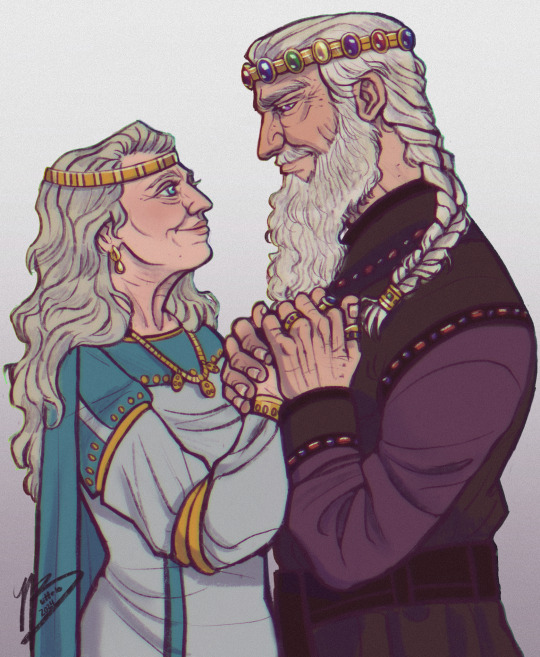
“How is it that I am the Old King now, but you are still the Good Queen?” he asked her once. Alysanne laughed. “I am old as well, but I am still younger than you.”
#alysanne targaryen#asoiaf#house targaryen#illustration#artists on tumblr#fire and blood#Spotify#jaehaerys targaryen
1K notes
·
View notes
Text


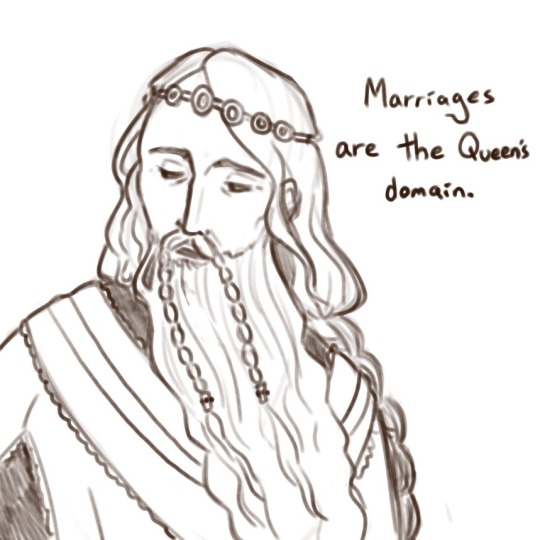

“In 86 AC, Queen Alysanne announced the betrothal of her daughter Viserra, fifteen years of age, to Theomore Manderly, the fierce old Lord of White Harbor.”
commission of my bby Viserra from @wodania
#viserra targaryen#alysanne targaryen#anti jaehaerys i targaryen#jaehaerys i targaryen#anti alysanne frankly#bc wtf was this betrothal#asoiaf art#fire and blood
312 notes
·
View notes
Text




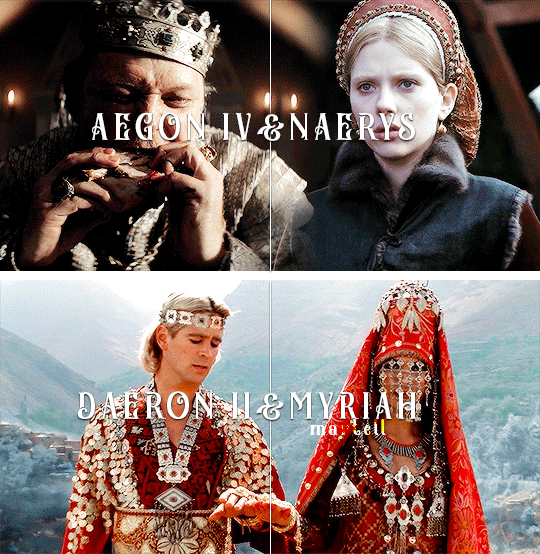


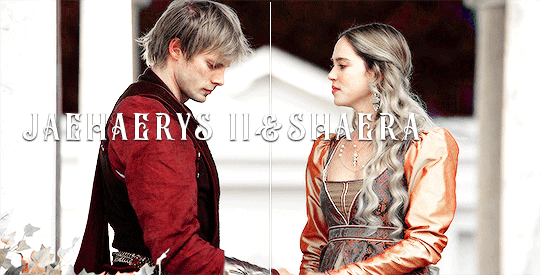
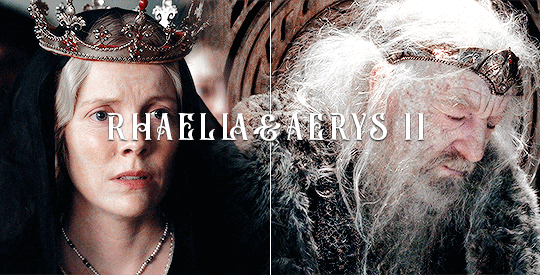

House Targaryen Line of Descent Since the Conquest From Aegon I to Daenerys I
#daenerystargeryenedit#daenerys targaryen#canondany#house targaryen#asoiaf#asoiafedit#gotedit#targaryensource#targnation#tvedit#tvgifs#tvandfilm#dailyflicks#fantasyedit#aegon i targaryen#rhaenys targaryen#aenys targaryen#alyssa velaryon#jaehaerys i targaryen#alysanne targaryen#rhaenyra targaryen#daemon targaryen#aegon v targaryen#betha blackwood#creations
711 notes
·
View notes
Text
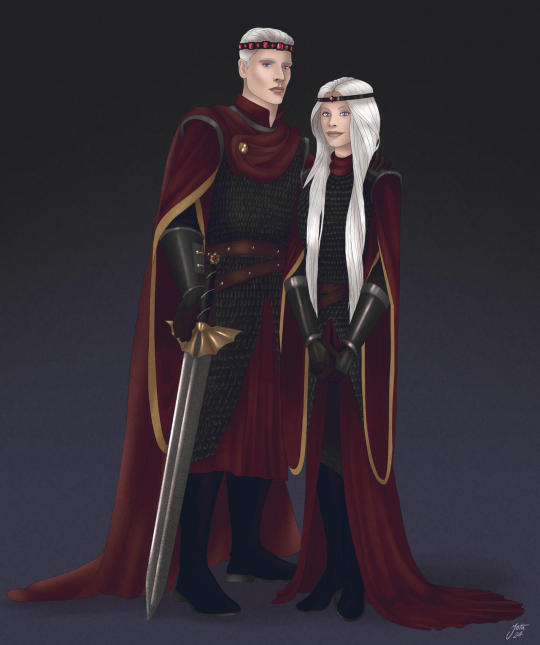
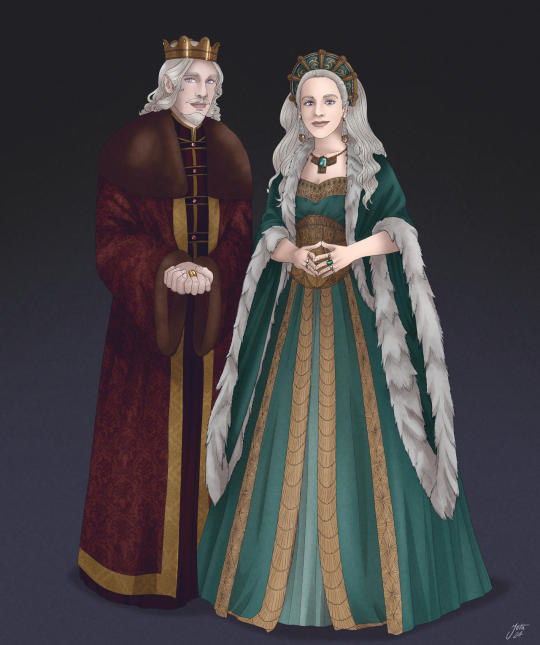
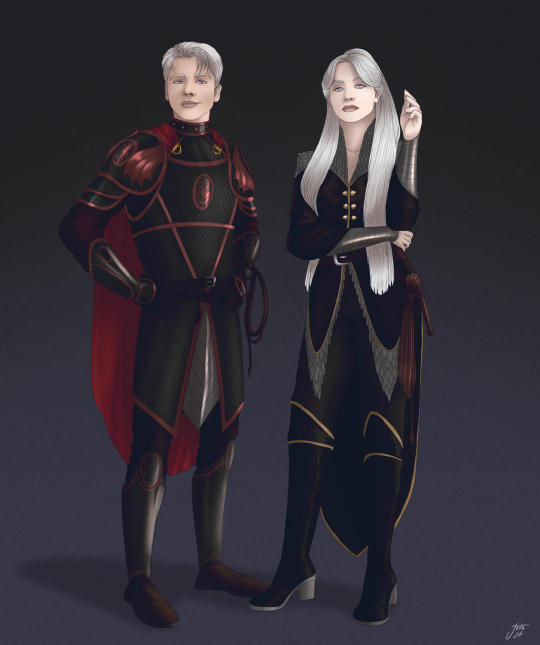
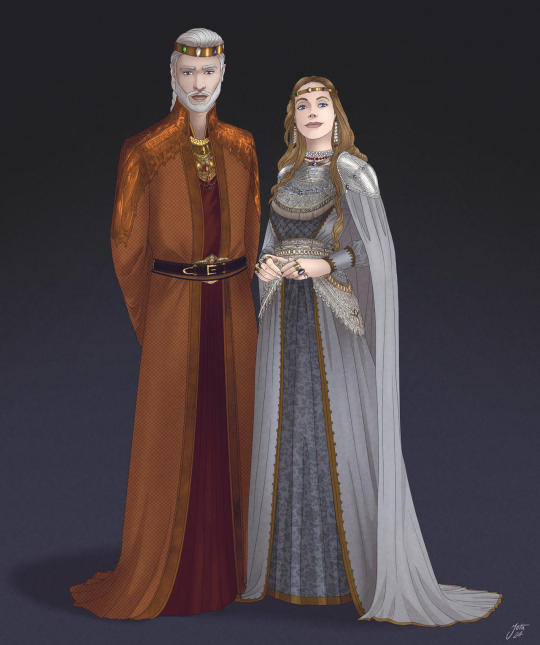
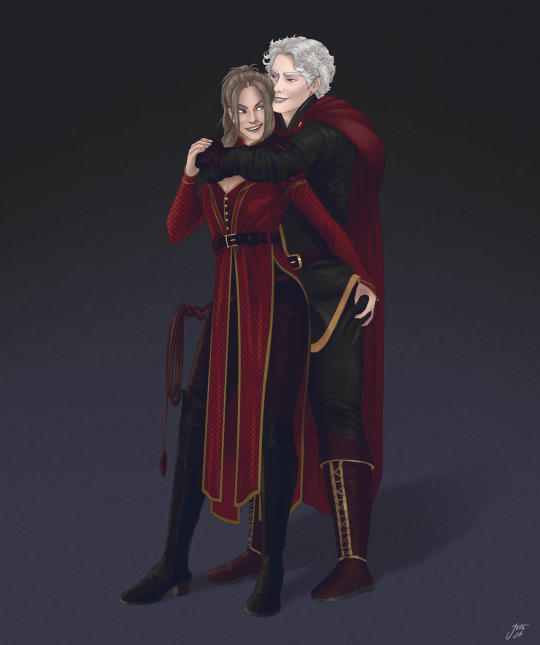
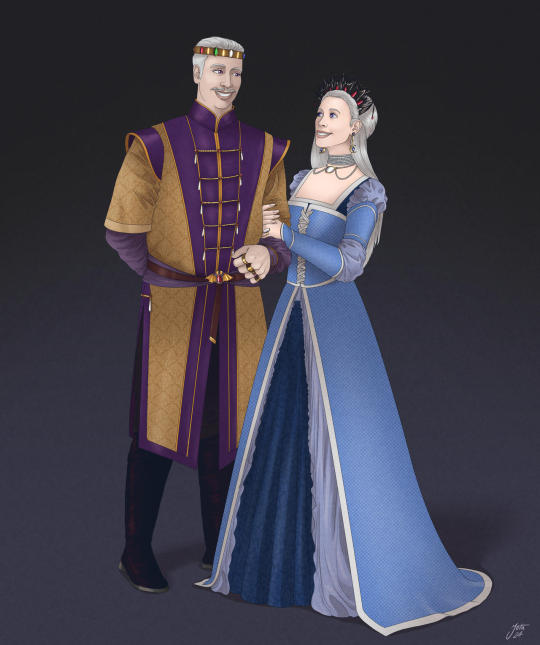
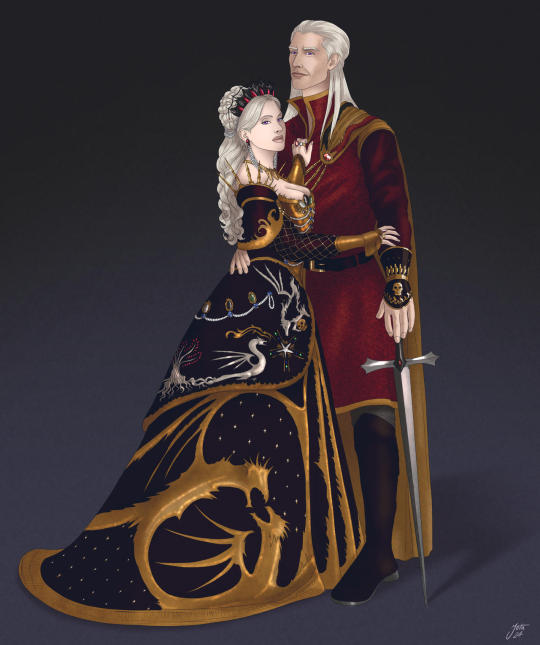
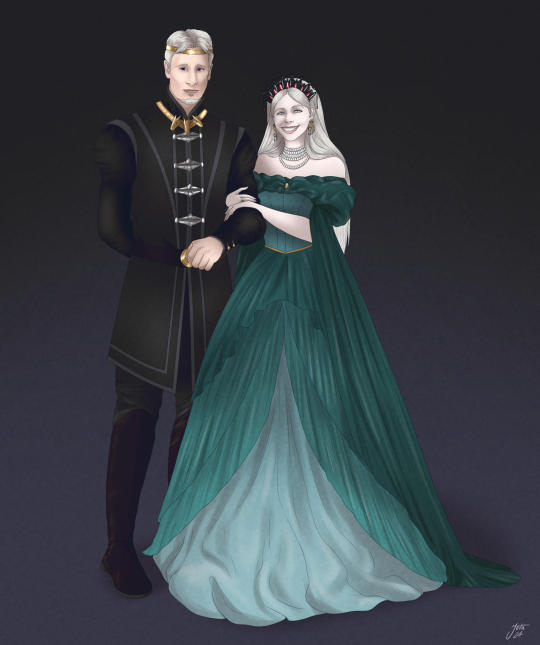
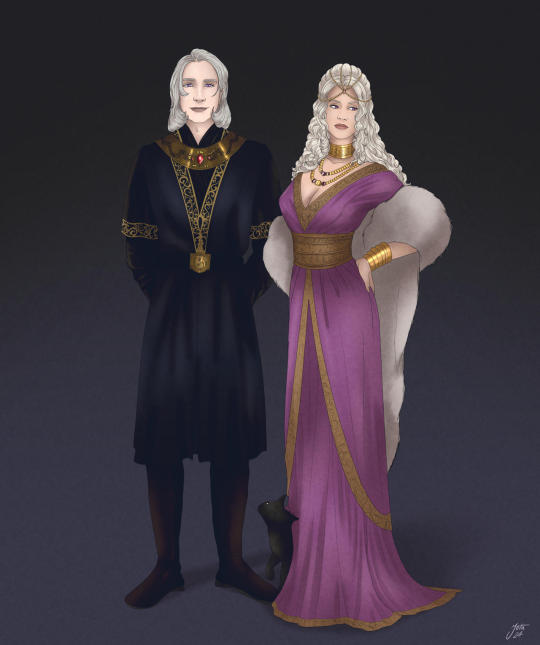
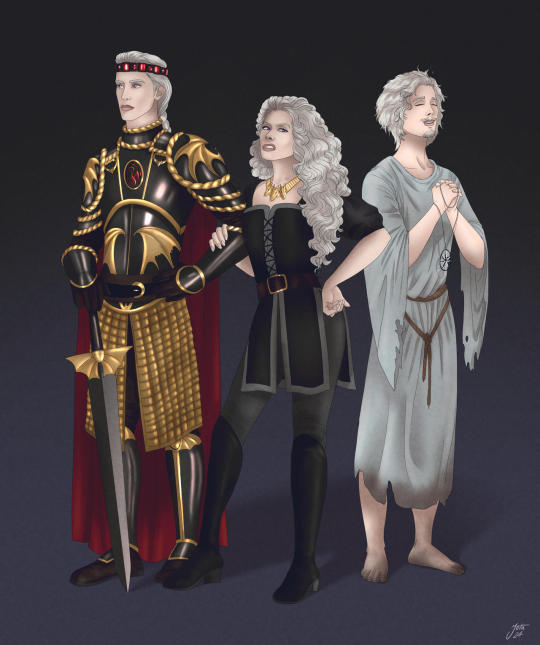
Valyrian Couples: Part I
Aegon I Targaryen & Rhaenys Targaryen
Aenys I Targaryen & Alyssa Velaryon
Aegon (son of Aenys) Targaryen & Rhaena Targaryen
Jaehaerys I Targaryen & Alysanne Targaryen
Baelon (son of Jaehaerys) Targaryen & Alyssa Targaryen
Viserys I Targaryen & Aemma Arryn
Rhaenyra Targaryen & Daemon Targaryen
Aegon III Targaryen and Daenaera Velaryon
Viserys II Targaryen and Larra Rogare
Daeron I Targaryen, Daena Targaryen and Baelor I Targaryen
By JotaSaraiva
PART II
#a song of ice and fire#house targaryen#aegon i targaryen#rhaenys (sister of aegon i) targaryen#aenys targaryen#alyssa velaryon#aegon (son of aenys) targaryen#rhaena (daughter of aenys) targaryen#jaehaerys i targaryen#alysanne targaryen#baelon (son of jaehaerys i) targaryen#alyssa targaryen#viserys i targaryen#aemma arryn#rhaenyra targaryen#daemon targaryen#aegon iii targaryen#daenaera velaryon#viserys ii targaryen#larra rogare#daeron i targaryen#daena targaryen#baelor i targaryen#fanart#deviantart
343 notes
·
View notes
Text
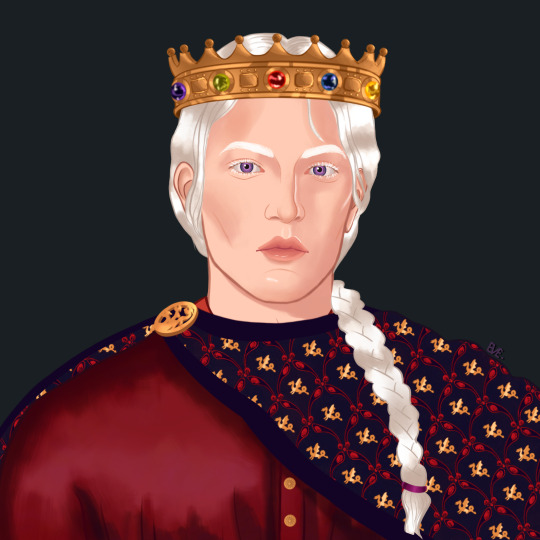
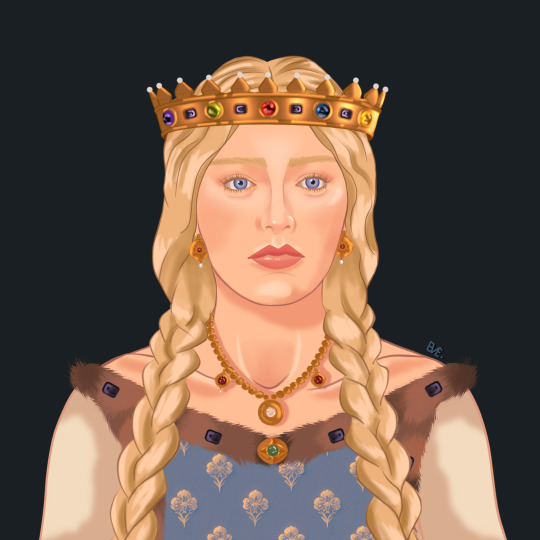
Jaehaerys i Targaryen and ‘Good Queen’ Alysanne Targaryen 🔥🐉
~~~~~~~~~
drawing their children next ☝️
#asoiaf#a song of ice and fire#game of thrones#fire and blood#f&b#jaehaerys i targaryen#alysanne targaryen#targaryen#house targaryen#my art
254 notes
·
View notes
Text
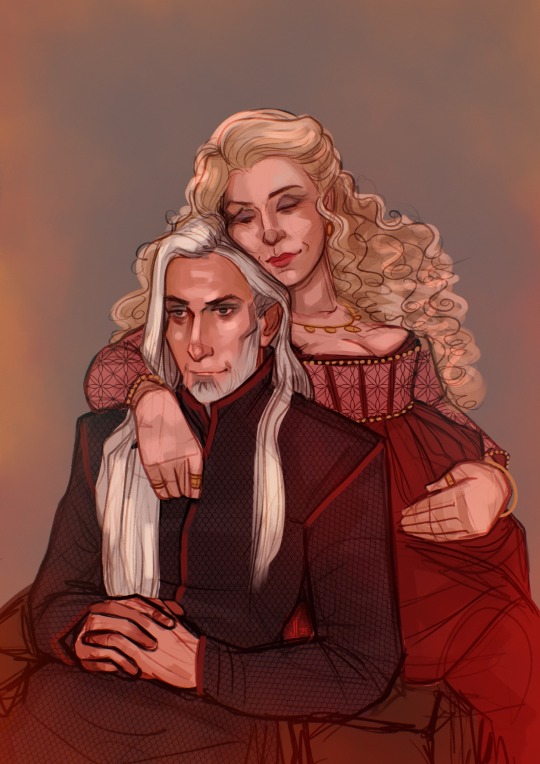
A doodle of young Jaehaerys and Alysanne from my neverending pile of Targ sketches 😅
Please do not repost without my permission!
#joycieillustrations#hotd#fire and blood#jaehaerys targaryen#king jaehaerys#alysanne targaryen#queen alysanne#queen alysanne targaryen#lord knows which bun she has in the oven here#Alyssa maybe?
198 notes
·
View notes
Text
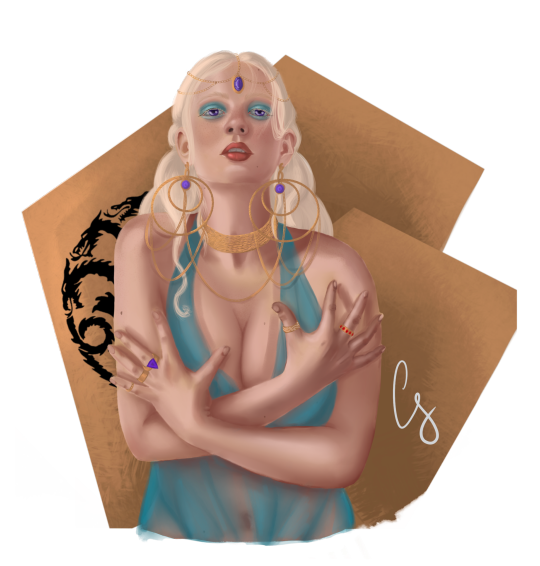
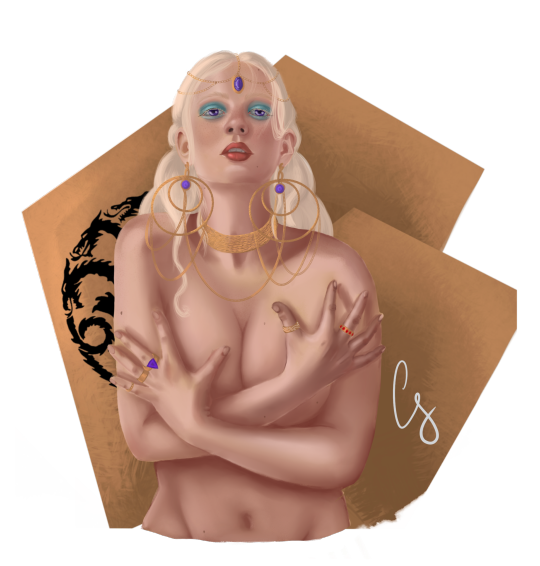
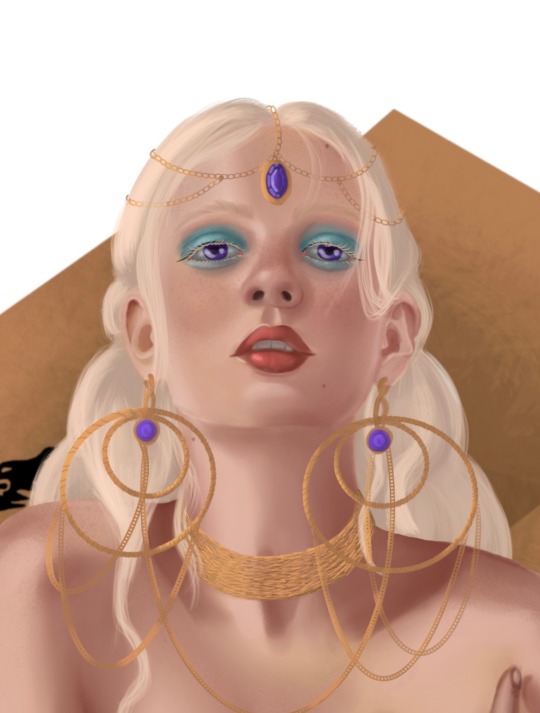
Saera Targaryen
#asoiaf#asoiaf fanart#house targaryen#a song of ice and fire#valyrianscrolls#my artwrok#saera targaryen#jaehaerys i targaryen#alysanne targaryen#no septa clothing cause this one is too matured for that stuff#fire&blood#not so very much disgraced princess#the one who lived her life
296 notes
·
View notes
Note
i love the idea of visenya being the queen for many reasons, not the least being that it means jaehaerys is from an accessory branch of the family and not in the direct line of succession and never becomes king :)
westeros if someone could convince jaehaerys to be happy as a mid-level bureaucrat instead of the king:

#king rhaena master of coin jaehaerys master of laws alysanne could hack it as a regime#asoiaf#king visenya au
112 notes
·
View notes
Text
King Aegon I's Grandchildren
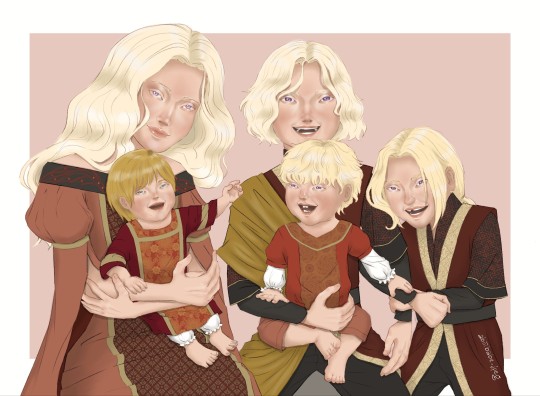
Children of King Aenys I Targaryen and Queen Alyssa Velaryon
(Eldest to youngest) Rhaena, Aegon, Viserys, Jaehaerys, and Alysanne
#digital illustration#artwork#digital art#house targaryen#house of the dragon#got art#game of thrones#asoiaf#asoif fanart#princess rhaena targaryen#rhaena the black bride#prince aegon targaryen#aegon the uncrowned#viserys targaryen#king jaehaerys the wise#jaehaerys i targaryen#jaehaerys i#good queen alysanne#alysanne targaryen#king jaehaerys#a song of ice and fire
133 notes
·
View notes
Text
Aegon I to Jaehaerys I and the Dance: Culture Contact, the Dissolution of Family, and Succession
Disclaimer: Long & EDITED
I can see where some people would have a lot of sympathy for Jaehaerys, who faced an uncle’s murderous intent and a future stepfather’s treacherous intent AND had to shore up defenses for his own political security and validation as a king.
Before Jaehaerys
The Targaryens have had a major problem that needed solving or settling since Aegon I conquered Westeros: how to rule when your means to power conflicts or troubles with the larger body of people’s customs.
Acculturation:
Acculturation is broadly defined as a process of cultural and psychological change that occurs when two cultural groups interact. Cultural changes include alterations in a group’s customs, and in their economic and political life. Psychological changes include alterations in individuals’ attitudes toward the acculturation process and their cultural identities. Acculturation has a strong conceptual and empirical appeal in psychological research because of its hypothesized, as well as demonstrated, relationships to a wide array of psychosocial factors among ethnic groups that are in culture contact settings. These include: mental health, sociocultural adaptation, acculturative stress, self-identity, and personality, to name a few. Berry, proposed a bi-dimensional acculturation model based on two issues important to those who are in intercultural contact. These issues refer to the extent to which individuals and groups (1) seek to maintain their heritage culture and identity; and (2) seek to have interactions with people of other cultures in the larger plural society. When these two dimensions are crossed, four acculturation strategies are defined: assimilation, separation, integration, and marginalization. Assimilation exists when individuals do not wish to maintain their heritage culture, and seek to become fully involved with the larger society; Separation exists when ethnic people place a value on holding on to their original culture, and at the same time, wish to avoid interaction with the dominant culture. Integration exists when individuals wish to maintain their heritage culture and also aspire to be fully engaged in the life of the larger society. Marginalization, an exact opposite of integration, reflects minimal interest in either heritage cultural maintenance or connection with dominant culture.
The Girl-lessness of the Second Generation
It’s popular in the fandom to say or think that Aegon I was lucky to not have had a daughter or a girl who came before either Aenys or Maegor because he would have had to contend with the other lords’ pressures and possible threats towards the possible decision to name a girl as his heir and set up equal primogeniture. these lords whose fathers, uncles, etc all died during the conquest and who are all now coming into their own positions of power, some relying on the social preference for male leaders. Aegon I never had to deal with that circumstance, so he faced no problems.
Well, the problem with that is that eventually there statistically will be an eldest female child (Rhaena, Aerea, Daenerys, & Rhaenyra) at some point in the dynasty and the window of opportunity will get smaller and smaller for a female Targ Queen with each passing generation of male rulers.
And without a girl to raise alongside his sons (eldest or not) as their peer, Aegon I was not able to address the issues that his sons and those around would have with a possible female heir. In real-time. To have the chance of declaring and setting up female Targs to have their own right to authority and leadership even over their eldest male sibling. There was no girl asserting herself and confronting her brothers/Westerosi patriarchy, or her brother(s) publicly declaring and supporting his eldest sister. Forcing the existing Targs to structure and plant a pole in the sand concerning how their dynasty/house would arrange their members’ roles and potentially make it more equal even with the Westerosi lords' contempt and rebellion.
Without a sister to be trained/raised alongside Maegor and Aenys like Visenya and Rhaenys were with Aegon I, the ability to rule and became constrained to Aenys and Maegor. (hamliet has this great meta as to how and why Visenya allowed Maegor to act as he did and her relationships with her siblings HERE) precisely because Maegor was emotionally more reserved for her and she felt less lonely after his birth. Without a sister/potential partner to have built a relationship with, there were fewer experiences where they had to contemplate and shape themselves around and for that female peer. They didn’t have to emotionally or psychologically accommodate themselves around a female Targ peer nor were encouraged to. So it was easier to not see them as peers or equals and see other, non-Targ women as more baby-makers or subject-wife than ruling-partner. This obviously goes for Maegor, with how he treated his wives and killed them; but we see it too with Aenys and how he didn’t make Rhaena his heir, who was his and Alyssa Velaryon’s eldest surviving child.
Andal preference and patriarchy would have had much more of an influence on how these two thought about their own and their female partners’ roles for power consolidation...which is subsidiary to the point of baby-maker instead of a more shared role like Visenya/Rhaenys. Even with Visenya’s personality and living to advise Aenys and seat Maegor. Instead, things fell by the wayside towards the more seemingly expedient option for the male rulers -- because of that lack of confrontation and possible subsequent acculturation (when the minority maintains some of their cultural identity).
Valyrian Custom vs Westerosi
Aenys and his brother Maegor I were merely the second generation of ruling Targs and the first born into monarchy. And it goes without saying that the Targs were not ethnically nor fully “Westerosi” but Valyrian, along with having with conflicting customs such as polygamy and sibling/avunculate incest marriage (even with the first cousin and two Stark examples of avunculate marriages in non Targ Westerosi marriages).
Even though the Targs do not seem to have taken as much Valyrian objects and practices with them when they fled the Freehold and Valyrains were not as gender-egalitarian as the Rhoynar (as egalitarian as principalities can be), we also see many examples and suggestions of Valyrian customs and culture being much less restrictive and oppressive towards women than Westerosi/Andal/First Men culture through:
Aegon I having to marry his sister Visenya according to Targ House rules
Jaenaera Belarys riding her dragon completely alone and facing no sociopolitical consequences for it
Visenya and Rhaenys’ multiple interactions with Aegon (how the Kingsguard came to be) that Westerosi people would probably call “liberties”
their ability to autonomously make laws (not suggest, make)
both women being entrusted to conquer pieces of Westeros’ proto-realm kingdoms -- Rhaenys with Dorne and Visenya with the Vale
both of the wives’ children being considered heirs/claimants in their house. Not the throne, house!
In the face of the Westerosi subjects being ruled and its customs towards (preferred) male primogeniture, the rules of succession and the distribution of power amongst the royal members of this house inevitably fell into a questionable state after the cultural contact. What does it mean for a potential female ruler and lawmaker to exist to lead Westerosi men? For Visenya, it meant something to fear and revile, as she’s traditionally referred to as either a witch or the one totally responsible for Maegor’s cruelty; for Rhaenys, it means that such a woman is given too much power and license to use it and endangers her husband’s hold on power through her son’s doubted parentage (after suspicions of infidelity) all for being “allowed” and choosing to surround herself with male companions.
Aenys I:
coming to be doubted or just suspected as unfit and probably not given much reality checks for the love Aegon bore his dead mother (protectiveness)
looking at his mother’s history
seeing how placating the Westerosi sensibility for a male heir
seeking to please as many people as possible
hearing from his father, or just partially observing that it’s important to consider the subjects’ expectations of the ruler when making decisions for those subjects when the Targs -- isolated from their old home and being the only Valyrian dragonriders left in the world -- have just started to create and set up a new political body from their conquest
chooses the easier, assimilative way and makes Aegon his heir. And he will continue to try to make what he thinks are the easier, safer decisions, the ones that he thinks will inspire admiration through his agreeableness and constant appeasing "strategy".
But he still needs to both preserve Targaryen domination/rule over Westeros AND maintain their hold on the house’s biggest practical asset and cultural identity marker: dragonriding (as the whole point of Valyrian dragonlords marrying their siblings, aunts, and uncles was to preserve their magical ability to ride and command dragons). So he marries his son Aegon to his daughter Rhaena thinking that he sufficiently satisfied those two requirements or pressures--a man rules (Andal) but marries his sister (Targ/Valyrian dragonlord) and that in other policies, actions, words, etc. Thinking in this way, he could"convince" Westerosi peoples that this was just a thing he had the “right” to do because he was king and had already satisfied a principal cultural practice.
The problem is that he seemed to ignore just how much influence the Andal religion would have even in the aftermath of a conquest and did not closer inspect how beneficial his mother’s and Visenya’s shared contributions had towards Aegon’s rule. That he never developed a good balance between the need for dynastic security vs love from the public/validation for his rule. And that it’s actually unfortunate that he didn’t have a sister to marry so that this problem could be directly addressed during Aegon I’s time.
So he did nothing to secure the lives and claims of his children, and failed at both the security and love bits. And sacrificed his daughter’s claim to create this false political balance. An opportunity to create more candidates and widen the chance of having more competent or safer options for a ruler. Aside from more evenly dispensing power and improving the lives of Westerosi women decade by decade.
Jaehaerys’ Relationship with his Family Pre-Scandal
To make this clear, this is the person who is most at fault for the Dance if the Dragons. His misogyny ruined it all.
A)
Unlike Aenys I and Aegon I, Jaehaerys did have a sister (2) and did have daughters (5 into adulthood). However, he comes from a completely very different set of circumstances. One of being exposed to the threat of death almost from his early late “preteens” and early teens.
Jaehaerys’ mother Alyssa had to leave his brother Viserys behind to save him and his sister while his uncle definitely would have held them all hostage and used their lives to threaten his opponents. Jaehaerys, from an early age (before 15) was vulnerable to the instability of a violent rule (Maegor) which itself came to be from a poorly managed and unfirm rule (Aenys). So we see through his thoroughness and use of both "soft power" (sending people out to teach crowds about how to look at Targ sibling marriages using Faith principles, eloquent speakers who happen to be Faith-aligned-or-vocated; got a more tolerant High Septon) and "hard power" (military intimidation with the Faith and dragons) to stabilize his rule and publicly validate his fitness for the other Westerosi lords, that Jaehaerys valued expediency in the form of male rule (LINK):
The difference between soft and hard power in international politics is the use of force. Soft power resources are the attractive attributes of a country—such as a civil society, human rights, and opportunities for individual success—that inspire other countries to want the same goals.
On the other hand, hard power coerces compliance through inducements such as military force, economic sanctions, or the control of exports to compel policymakers in other countries to acquiesce. The Russian invasion of Ukraine, during which Russia successfully annexed Crimea, is an example of hard power that led to the largest territorial gain by force since the end of World War II. The United States invading Iraq is another example of hard power.
[...]
5 Examples of Soft Power
Business and trade: This type of soft power centers on the allure of a country’s business acumen, the success of its economy, and its ability to innovate. Japan, for example, wields great powers in business because of its high levels of investment and many globally recognizable electronics and auto industry companies.
Culture: This is a country’s power to influence others through its cultural riches, such as art, literature, music, or even pop culture. American soft power includes popular media like movies, music, and television. The European Union attracts admirers with its art, music, and architecture. Korea’s K-pop music attracts fans from around the globe with its catchy tunes and charismatic performers.
Education: Educational soft power is when a country becomes a desirable destination for international studies due to high-quality institutions and scholars. Some countries, including the United States, attract many international students.
Governance: Soft power in governance means respect for freedom and democracy for citizens, resulting in a civil society. For example, US foreign policy supports human rights and international law.
International relations and diplomacy: Public diplomacy in foreign affairs and contributions to global development are potent sources of soft power. Being able to handle public affairs, like international conflicts between superpowers, with diplomacy is a soft power.
AND (LINK):
[Soft power] is the ability of a nation to exert control by economic, political, moral or cultural means.
And that inevitably included adopting the Westerosi practice of restricting and controlling their female relatives’ bodies more than their sons, since female heirs are not seen as strong or competent leaders and thought of as weakening the house’ hold on power...because the dominant order already ruled that daughters could not autonomously inherit or even have a role without being sexually tied and bound to a man in some way, whether that being from his loins, having his children/being married to him, or being his mother.
B)
While Alysanne was involved with Jaehaerys’ policies, she never had the sort of law-making power that Rhaenys and Visenya exercised.
I assume this is because after Maegor's putting the realm on its toes, Jaehaerys wished to make sure that the Targs could live as much as themselves and remain in power with the threat while coexisting with the Faith, hence the Doctrine of Exceptionalism allowing the Targs from then on to marry their siblings without real protest of interference like before Jaehaerys's generation. And considering how he came into the throne not totally of his own volition at 14 years of age (his mother put him there partially to ensure his and Alysanne's safety as well as revenge; the various lords would likely not have wanted a 6-7 yr old over an older candidate--though of course, they sighed gratefully for a boy over a girl). If he had said that they should instead crown Aerea (who was still with Maegor at this point, along with Rhaena, her mother/his eldest sibling) to the group of men and his mother, it's not likely that they'd take him seriously or allow him to step away. And after losing his older brothers' to violent ends (Viserys and Aegon) Jaehaerys would have had another layer of incentive to ensure the security and longevity of the Targ dynasty/whatever family he would build. How? Make compromises with the Faith, Andal patriarchal mores, made sure his relatives did nothing to debilitate or make him appear weak--while using force when necessary/simultaneously. The "balance" favored patriarchy, obviously, but there was an edge he was walking and continued to feel even after he grew more into adulthood and more faith was put into his leadership abilities. The ghost of what could have happened and what has happened obviously followed the guy into his death, manifesting in his mishandling of his own children and the existence of the Great Council.
Going back to his wife, Alicent never actually wrote or made any of her suggestions into any laws by herself but put forth ideas to the council and Jaehaerys. Most times this was not hard to do because she didn't often confront those things that would make them have to change or abolish long-running Andal/Faith customs and injustices or those that give them more power. Jaehaerys never gave her an official, independent position in the council and largely ignored her when he didn't like her ideas or when they didn't support his conciliatory (placating the Andal-descent lords) purposes and goals (Daenerys, Rhaenys passed over and his reluctance with the abolishment of the right of the first night). The guy absolutely made an unconventional council that included a woman, a common-born septon, and a foreign Essosi businessman who were all instrumental, showing his intelligence and ability to discern what he needed in advisors and find competent persons around him. He didn't limit himself in this regard. He made sure Westerosi would have its first intraregional road system--or the beginning of one--which would have improved the transport of goods and persons and thus boosted the economies of various places, allowing people to have more choices in where they settle, and making sure KL/the court especially got their suppplies. Thus I'd assume that court life became much more robust, people communicated more easily, and Jaehaerys was easily able to perform royal progress. All of this made the king-subject relationship that much closer, as people would see their king more often and feel his presence, be heard, and feel as if they mattered.
It's his domestic life where he really fumbles the bag, but how he treated his daughters (and the bookish, non-conforming son Vaegon in Vaegon's childhood) also contributed to the trend of Targaryen women/nearly half of the Targs being oppressed and unable to really participate in the family's political sustenance as Visenya and Rhaenys did.
And we hear of no preparation made for their daughters. This follows the declining trend of Targaryen men intentionally leaving out Targaryen women more and more from active politics.
D)
Therefore, in his bid to solidify the Targ dynasty by investing more responsibility and power in his sons than his daughters, Jaehaerys intellectually neglected his daughters and left them to be more passive members of the family for marriage alliances. To him, his daughters were to be quiet actors or extraneous pieces to be told what to do and who to marry only. Girls were more to be seen and not heard.
Because they were not allowed to:
actively make political decisions or learn to rule in some way (even as a female head of house like any other lord, general, etc.) like Rhaenyra at Dragonstone
or even sit as Alysanne did at councils whether to suggest or be as Rhaenyra was and be cupbearers to hear them deliberate and learn
Jaehaerys did not feel the need to actually understand how they thought about their rights, their autonomy, what their parents owed them, etc. Until he was blindsided.
Jaehaerys was pushed toward but also nurtured his own blindspot. He created daughters he was unfamiliar with that he could not understand. And them not being able to really understand him (except maybe Maegelle).
Moreover, his seeking to maintain control and power justified his treating her as an anomaly or a threat to his power and authority, instead of as his daughter.
For that matter, there is no indication that Jaehaerys ever really spent enough special, family-bonding time with his kids, again, his daughters especially. His sons were active political participants whom he interacted with more because of said politics: Aemond and Baelon both served as his Hands and Jaehaerys went to Vaegon for advice over the succession after Baelon's death even after he had been sent to the Citadel and Jaehaerys had already tried to get that guy interested in swordplay more over books. Maegelle helped her parents to tolerate each other again, but she, like the rest of her sisters, did not participate in political decision-making and wars. Despite the fact those daughters very well could/would have been dragonriders.
Their children would have grown up with septas, maids, and wetnurses more than with their parents for education and everyday care both because of the social expectations of their class and the real duties of a King AND how Alysanne, as Queen Consort/a noblewoman was not expected/somewhat discouraged to be as involved as a commonborn mother in her kids' daily lives (assuming from real life medieval history) and she at least was more in the council or on a mission by herself than any other Queen Consort after her (Alaric and the Gift). Both as a noble/royal man and a King, Jaehaerys wouldn't have been around his children in general, Alysanne, as a noble/royal lady, also would not. (Compared to a common-born woman.)
But compared to Jaehaerys, Alysanne could and did spend more time with their kids than him due to her duties as the Consort/"lady of the castle" and not a law-maker herself. Even with the great number of kids, she appeared to get to know them as individuals better than Jaehaerys: how Alyssa and Baelon married, Viserra's conflicts with her, Daella's caretaking and time spent with her, her observing Saera and (again) often comparing her to Aerea to Jaehaerys as if he weren't there to see it for himself, and this:
[...] long before she was half-grown, Saera had learned the art of getting anything she wanted from her father: a kitten, a hound, a pony, a hawk, a horse (Jaehaerys did draw a firm line at the elephant). Queen Alysanne was far less gullible, however, and Septon Barth tells us that Saera’s sisters all misliked her to various degrees.
(Fire and Blood; Jaehaerys and Alysanne; Policy, Progeny, and Pain)
So it's not all due to Jaehaerys' position and myriad duties, progresses, and projects as a King that drew him away from his kids. So much as his belief in how much he should/could invest himself in his children's everyday lives, even coming from their young-young childhoods. And Alysanne was mostly left with the task of arranging her kids’ marriages and doing so based on what she observed of their personalities and needs, while Jaehaerys didn’t really contribute insights any deeper than Daella being scared of a lot of things, for example.
Here is another example of Jaehaerys being unaware of his own kids:
The frustrations started with Vaegon and Daella. Only a year apart in age, the prince and princess seemed well matched as babes, and the king and queen assumed that the two of them would eventually marry. Their older siblings Baelon and Alyssa had become inseparable, and plans were already being made for them to wed. Why not Vaegon and Daella as well? “Be sweet to your little sister,” King Jaehaerys told the prince when he was five. “One day she will be your Alysanne.”
As the children grew, however, it became apparent that the two of them were not ideally suited. There was no warmth between them, as the queen saw plainly. Vaegon tolerated his sister’s presence, but never sought it out. Daella seemed frightened of her sour, bookish brother, who would sooner read than play. The prince thought the princess stupid; she thought him mean. “They are only children,” Jaehaerys said when Alysanne brought the problem to his attention. “They will warm to one another in time.” They never did. If anything, their mutual dislike only deepened.
(Fire and Blood; Jaehaerys and Alysanne; Policy, Progeny, and Pain)
He was taken completely by surprise, in utter shock that Saera was capable of the lies, the self-preserving performance, and just the act of "giving away her virginity" to any guy she fancied without parental (a father's actually) permission. One could say that it was at that moment Jaehaerys realized how little he actually knew his daughter. Alysanne was never as surprised as him:
"'True?' said Saera. It was in that moment, with that word, that the contempt came out. “No. I gave it to all three. They all think they were the first. Boys are such silly fools.” Jaehaerys was so horrified he could not speak, but the queen kept her composure. 'You are very proud of yourself, I see. A woman grown, and nearly seven-and-ten. I am sure you think you have been very clever, but it is one thing to be clever and another to be wise. What do you imagine will happen now, Saera?'"
"Queen Alysanne was less convinced. 'Saera is clever, but not wise,' she told the king. Lady Perianne and Lady Alys were pretty, vapid, empty-headed little fools from what she had seen of them, whilst Connington and Mooton were callow boys. 'And I do not like this Stinger. I’ve heard he sired a bastard in the Reach, and another here in King’s Landing.'"
"When the queen told him what she had learned, King Jaehaerys could scarce credit a word of it.
It could be said that a feudal man's (or man living in a patriarchal world) grief would not be recorded or paid attention to as faithfully as a woman's since it is more expected from mother's and women, but seeing as to how Gyldayn and Septon Barth both do not stop themselves from detailing Jaehaerys' behavior throughout his reign (his dealings with Rogar, the progress after the First Quarrel, his interactions with his council members), I don't think that's not a strong or plausible enough argument.
There is also the previous embarrassment and scandal of Lucamore Strong, a man who had taken the Kingsguard's celibacy vows yet married three different women and fathered more than 10 kids collectively. Lucamore's actions arguably reflected badly on Jaehaerys, as Lucamore did all of this without Jaehaerys never coming to know of it, some people around and in the court might think. Lucamore also "soiled" his Seven-anointed position and vows, so that "stain" is also joined with Jaehaerys' reputation. Notice how Alysanne says she doesn't want Lucamore "near" Jaehaerys ever again?
Saera’s Scandal
A)
This is one opinion of Alysanne and Saera:
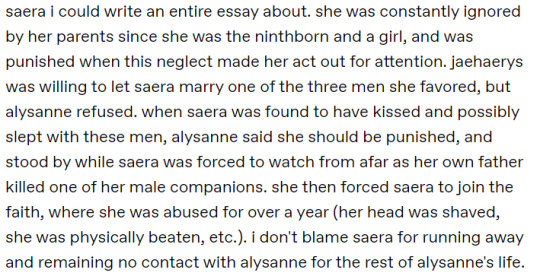
I agree that Jaehaerys ignored & neglected Saera--while not perfect in the emotional department, Alysanne was actually the more emotionally and physically engaged parent and the one who constantly observed several things about their children while Jaehaerys did jack. even just consulting and checking in with the nanny-servants, etc. (I have a myriad of examples peppered throughout the analysis below, so I won’t mention them here. Enough that a pattern and truth emerge.)
Secondly, Jaehaerys was never willing to marry Saera off to any of the three men she slept with because of two possible things: either he felt this was conceding to what he believed was Saera's threatening insubordination after her refusal to regret or be ashamed for her sexual defiance and for the marrying all 3 comments "like Maegor" (the guy Jaehaerys no doubt feared and hated in his earlier memories) OR he thought it would get out that Saera was "ruined" and further taint the Targ family by having not even been possibly tied to the guy who "took" her virginity. She refused to name who exactly did if she even knows...as it's very possible that she was drunk and incognizant during that encounter. We must remember the group was visiting taverns and brothels, where alcohol often is. He actually outright refused to do so after she said that she was willing to marry any or all three (QUOTE), which is fair because such a thing would cause a greater scandal than Maegor (because she is female, such a thing couldn't happen especially since all those boys marrying her would introduce problems of subservience and more possible claimants than one would need or handle possibly disrupting the main line Jaehaerys intended) and because of Maegor's legacy. [More on Saera, Maegor, & Jaehaerys under " " below]
He only gave two options to Connington: the Night’s Watch or a ten-year exile, and the latter chose exile only to die before it ended. He "dueled" with Beesbury and killed him. And he married Mooton to Perianne Moore. Alysanne never ever said no to a marriage between her daughter and any of the three boys. She's not even consulted, it seems, perhaps because she knew that Jaehaerys would not budge or perhaps she even agreed a little with him. I lean towards the latter because her language when describing Saera is disparaging (later in this post--section B).
It's interesting, bc while Saera's "innocence" and childhood are being stripped from his purview, he might have felt the loss of his own all over again from that Maegor comment.
Saera mentioning Maegor and likening herself to the man who terrorized his closest family--even killing two of their brothers/Saera's uncles--is her definitely trying to hurt and get a reaction from her parents while also trying to foist off the pressure of accountability (bc while I'm still all for female sexual autonomy, it's clear Saera was practicing something much more self-harmful and abusive towards others). Like a lot of teen girls, especially those who do not feel OR are not actually given enough regard or allowed to do some things fulfilling or expressive of trust and care, she sought Jaehaerys and Alysanne's attention by hurting & upsetting them. And I'm sure Jaehaerys' emotional absence and giving her things rather than attention comes from the lack of time he spared, how many kids he foisted onto Alysanne to birth and risked her life to give PLUS him not really feeling he needed to invest in Saera beyond her being marriageable for the sake of alliances for the dynasty/family's seat…this would be the stuff that he or some readers could also use to excuse not really thinking about any other perspective other than his own. We see that a lot in people (esp men).
So her "traumatizing" Jaehaerys--a 30+ man who has real authority over others, the time to form better connections to those around him with some other than giving them roles, and thus the responsibility to not lose his cool against a teen girl--is both real in the sense that she could have realized mentioning Maegor to one of those who he would have killed given the chance was not fait & could be upsetting... but why is she so desperate? Why does she want to or okay with maybe hurting her father? What is Jaehaerys doing to elicit such a response from his teenage daughter?
(One who is also citing actual Valyrian customs, even if we must consider if said customs have women having multiple husbands AS WELL AS men having multiple wives. In canon, it just says "sorcerers" without gender for those who did so in Valyria. And those who had multiple "wives" in the houses of the dragonlords, which seems like it was men having multiple spouses. Again, this was an opportunity to create something new in Westeros, in the Targ dynasty. I assume that Jaehaerys thought it both outside of a woman's privilege AND a risk too great for the power he himself had in this "ultra" patriarchal world.)
AND Jaehaerys never sought to figure out why and how Saera turned out the way she did. Perhaps it is asking too much out of a feudal man/King to actually get to know and keep track of his daughter's emotional well-being/motivations…but then we have Viserys, who still not the best father, remained arguably closer to and comparatively left more room for autonomy for his daughter Rhaenyra than Jaehaerys ever did for Saera, and we know it's possible.
Again, yes the trauma from Maegor and having to be the "best" man and "best", ideal sort of man for others to consider him a true king as well as people like Rogar and his mother not giving him much choice because there was no real choice--all of which happening while he was under 17---and thus that war trauma that Viserys nor Saera simply never experienced. I don't think this overpowers or matters more than the bad handling after he supposedly "calms down" that some people feel happens after he sends Saera to be punished. It's like he defaulted to battle mode with her for the sake of appearances. Should Jaehaerys have introduced more violence to Saera, psychologically and physically in response?! His own daughter? Obviously, it didn't work, and it was his (& a bit of his wife-sister's) responsibility.
Thirdly, while Alysanne did say that Saera should be punished for sleeping around, can we really exclude the pressure of Jaehaerys having punished Saera even worse if Alysanne had not been a mediating party? And as I already stated, Jaehaerys had all the ability to engage with all his kids and actually understand them -- that’s not on Alysanne. But Jaehaerys already unconsciously assigned his daughter specific roles (overriding their personalities and even personhood) before ever actually knowing the ones that came with them. Again, he had made sure that the family and their roles were shaped around his political needs more than finding that balance between love and security. He is the king and he already had a history of sidelining his female relatives for his own hold of power--Rhaena and Dragonstone/Franklyn Farman. He has more power than any person in his family, both Andal custom and he made himself the patriarch of said family. He determines/ed the shape of the domestic realm in his own castle through those familial connections that he is responsible -- at the end of the day -- for arranging and controlling. Just to repeat myself.
Fourthly, Jaehaerys has always shown a force of will that even butted against Alysanne: Daenerys being named heir, Rhaenys (before GC of 101), Saera. Against his sister Rhaena and her relationships with all three Farmans and the deal with the lost dragon eggs. He was ready to fly to Essos or wherever those eggs ended up and threaten whoever had them with war and dragonfire if they refused to give them back, considering them stolen goods of the Targs.
I'm sure that the reason that Jaehaerys was not so willing to back ALysanne in the clear desire of putting girls into the Citadel to become maesters themselves was because of that tenuous, nearly new "truce" and understanding between him and the Faith through the Doctrine. Introducing girls into the Citadel versus snatching the privilege to practice sibling marriage in one's own house are different in that Jaehaerys would be making stark, critical changes in a whole other ancient (1000s-year-old) institution. the Doctrine was more him making changes for him and his own "neck of the woods", his own family and dynasty, the place where he had the most authority Ironically enough, his descendant Baelor I would go on to burn several Citadel books he claimed were heretical and his ability to do so speaks to the affordance Jaehaerys set up for Targs + royal privilege + his clear, even if zealous, devotion to the Faith + people trying to stay away from even more martial conflict [the Dance and the Dornish battles from Daeron I]; books versus allowing a girl to be a maester are conveyed as two very different things--girls simply were not thought of as intellectual beings and Alysanne was felt as the "exception". We see that Alysanne struggled with feeling in control and having power or being recognized enough through her interactions with the maesters at Oldtown:
[...] Queen Alysanne remained in Oldtown. The silent sisters hosted her in their motherhouse for a day of prayer and contemplation. Another day she spent with the septas who cared for the city’s sick and destitute. Amongst the novices she met was her niece Rhaella, whom Her Grace pronounced a learned and devout young woman “though much given to stammers and blushes.” For three days she lost herself in the Citadel’s great library, emerging only to attend lectures on the Valyrian dragon wars, leechcraft, and the gods of the Summer Isles.
Afterward she feasted the assembled archmaesters in their own dining hall, and even presumed to lecture them. “If I had not become queen, I might have liked to be a maester,” she told the Conclave. “I read, I write, I think, I am not afraid of ravens...or a bit of blood. There are other highborn girls who feel the same. Why not admit them to your Citadel? If they cannot keep up, send them home, the way you send home boys who are not clever enough. If you would give the girls a chance, you might be surprised by how many forge a chain.” The archmaesters, loath to gainsay the queen, smiled at her words and bobbed their heads and assured Her Grace that they would consider her proposal.
(Birth, Death, and Betrayal Under King Jaehaerys I)
“Presumed”. “Loath to gainsay”. “Consider”. “Why not admit them...?” the question never addressed. All to say this was a moment where Alysanne tried to assert herself and had no effect without Jaehaerys attached.
So I ask...how does Alysanne truly have enough recognition/authority to override Jaehaerys’s stubbornness and will as (Visenya did to Aegon I)? To gainsay him against his intentions towards Beesbury? Did she feel always comfortable pushing him outside of the council room and inside the "domestic", child-rearing, family stuff? Her being told they could get more kids despite her saying she couldn't anymore and there is no recorded response (could've been tired from labor, but no comeback?).
Especially with how angry and humiliated Jaehaerys felt, how determined he was to eliminate the perceived threat to his authority and power?
Fifthly, it is after Saera escapes from her imprisonment the first time and tries to go to the Dragonpit AND Jaehaerys kills Beesbury that he, not Alysanne, sends his daughter into the Faith:
A fortnight later, Jaehaerys and Alysanne gave another of their daughters over to the Faith. Princess Saera, who was not quite seventeen, departed King’s Landing for Oldtown, where her sister Septa Maegelle was to take charge of her instruction. She would be a novice, it was announced, with the silent sisters.
Septon Barth, who knew the king’s mind better than most, would later maintain the sentence was meant to be a lesson. No one could mistake Saera for her sister Maegelle, least of all her father. She would never be a septa, much less a silent sister, but she required punishment, and it was thought that a few years of silent prayer, harsh discipline, and contemplation would be good for her, that it would set her on the path to redemption.
(Fire and Blood; Jaehaerys and Alysanne; Policy, Progeny, and Pain)
This emphasis on “king’s mind” lets us know that Jaehaerys was the one who made the decision or was the one pushing for and made the final choice to make Saera go to the septas. And Barth makes it clear: to “re-educate” her to make her more amenable towards Jaehaerys’ desires. Even if Alysanne was the one to suggest slow “redemption”, at that point she was doing all she could make keep Saera there, which involved placating Jaehaerys.
B)
Alysanne did seem to have fraught and complicated relationships with her daughters while expressing dread with their willfulness (the post I’m responding to): Viserra and her not wanting the marriage with Manderly and Saera, her whole life being compared to the dead and “unmanageable” Aerea.
Alysanne constantly compares her to Aerea, as if it were a bad thing. Implying that Saera was too "willful" and hard to manage...which admittedly shows that Alysanne still has this bit of prejudice (and internalized misogyny) towards women and girls who display noncompliance and nonquietness despite her castigating Rhaena for disparaging the absent Aerea and her taking out Balerion and running away...Alysanne saying that Aerea was "just a child" to Rhaena's "what kind of monster" she brought to life who would take the dragon who killed her father (Aegon the Uncrowned) of all the dragons she could have claimed. A frustrated rage of a person who didn’t get to really raise her own daughters for the sake of their survival but never bonded with them properly afterward.
It looks like Alysanne also inherited troubles with daughters that she rebuked and blamed Rhaena for. More than Rhaena does Aerea, though Alysanne abjects Saera into a monstrous feminine figure all throughout her childhood (while Rhaena's treatment of Aerea is arguably more sympathetic since Rhaena's *trauma* at Mageor's hands and her separation from her daughter, her daughter growing apart from her in that separation. A separation where they both lived conscious lives apart and long enough for them to be near strangers to each other).
How did Alysanne go from defending Aerea to her mother for claiming a dragon and running away to calling her Aerea-like with anxiety...and then had her own broken relationship with said daughter end with her also trying to run away on dragonback?!
When she actually sat with her children and had to manage them mostly on her own while Jaehaerys did whatsoever. Growing up and raising children more and more within the confines of the castle and royal court, where the customs would be observed and practiced more, Alysanne also grew to mentally and habitually adopt ideas and behaviors more than before Jaehaerys took the throne back.
C)
Though Jaehaerys had forbidden it, Alysanne had defied his edict and secretly engaged agents to keep watch over her wayward child across the narrow sea. Saera was still in Lys, she knew from their reports, still at the pleasure garden. Now twenty years of age, she oft entertained her admirers still garbed as a novice of the Faith; there were evidently a good many Lyseni who took pleasure in ravishing innocent young women who had taken vows of chastity, even when the innocence was feigned.
It was her grief over the loss of Princess Viserra that finally drove the queen to approach Jaehaerys about Saera once again. She brought Septon Barth along with her, to speak on the virtues of forgiveness and the healing properties of time. Only when Barth had finished did Her Grace mention Saera’s name. “Please,” she begged the king, “it is time to bring her home. She has been punished enough, surely. She is our daughter.”
Jaehaerys would not be moved. “She is a Lyseni whore,” His Grace replied. “She opened her legs for half my court, threw an old woman down the steps, and tried to steal a dragon. What more do you require? Have you given any thought as to how she got to Lys? She had no coin. How do think she paid for her passage?”
The queen cringed at the harshness of his words, but still she would not yield. “If you will not bring Saera home for love of her, bring her home for love of me. I need her.”
“You need her as a Dornishman needs a pit viper,” Jaehaerys said. “I am sorry. King’s Landing has sufficient whores. I do not wish to hear her name again.” With those words, he rose to leave, but at the door he halted and turned back. “We have been together since we were children. I know you as well as you know me. Right now you are thinking that you do not need my leave to bring her home, that you can take Silverwing and fly to Lys yourself. What would you do then, visit her in her pleasure garden? Do you imagine she will fly into your arms and beg forgiveness? She is more like to slap your face. And what will the Lyseni do, if you try and make off with one of their whores? She has value to them. How much do you think it costs to lay with a Targaryen princess? At best they will demand a ransom for her. At worst they may decide to keep you too. What will you do then, shout for Silverwing to burn their city down? Would you have me send Aemon and Baelon with an army, to see if they can prise her free? You want her, yes, I hear you, you need her…but she does not need you, or me, or Westeros. She is dead. Bury her.”
Queen Alysanne did not fly to Lys, but neither did she ever quite forgive the king for the words he spoke that day. Plans had been under way for some time for the two of them to make another progress the following year, returning to the westerlands for the first time in twenty years. Shortly after their falling out, the queen informed Jaehaerys that he should go alone. She was going back to Dragonstone, alone, to grieve for their dead daughters.
(Fire and Blood; Jaehaerys and Alysanne; Policy, Progeny, and Pain)
I agree with Jaehaerys that Saera wouldn’t (at first) willingly go back to the Keep but not totally or what people may probably at first think.
While Jaehaerys ignored Saera except when he gave her gifts and overly spoiled her, Alysanne didn’t seem to encourage Jaehaerys to spend more time with his daughters bc she ane we know that he wouldn't be that willing. Alyssa is an interesting situation -- too young to be married...but Alysanne married at 13 -- to Alyssa’s 15 -- to 15-year-old Jaehaerys by her own full will and managed to birth children well enough, so why should she deprive her daughter what she fought for herself (thinking in Alysanne’s POV)? And again, by the large Westerosi standards, 15 is actually a safer place to begin birthing and being married. So to Alysanne and in context of the circumstances/society/world, we shouldn't castigate Alysanne for trying to do what most lords wouldn't try to do for their daughters--give them happiness and safety AND not make it subject to the dynastic/house needs. While Alysanne seemed to have done little to nothing to protect her daughters from being married too soon or married to too-old men (she actually tried with Daella and wanted Gael with her always, even if that last one was sort-kinda for Alicent's to be comforted with her losses and assure herself that she still had living kids by keeping one close to her), Alysanne herself was also married at 13! Not only did she, like most Westerosi, think that she was creating both advantages for her daughters and the Targ house, but she has also always been Jaehaerys’ “helpmeet” more than his equal.
Alysanne frequently wanted and expressed Jaehaerys to consider his eldest Daenerys his heir and pleaded with him several times to allow Saera back. Jaehaerys is and was always the one to refuse when he felt his authority was on the line. And as I said before, Alysanne was always the one who needed to persuade him nor had the power that Visenya or Rhaenys had. Of course, until she thought she couldn't go past a certain line where Jaehaerys would not be persuaded by her anymore...unless it was Barth or another. Ugh.
Alysanne was often reacting and deferring to him since both were in their teens. We must remember that they married when she was 13 and he 15! And ever since then (a little while after), she has been popping out child after child, even when she told Jaehaerys she couldn't anymore and he dismissed it saying that their mother (who died of childbirth) was able so she could still do it in her 40s. some of these births were stillborns or kids who didn't live past 1.5 years!
Alysanne did not have the ability to order her isolated imprisonment w/o Jaenaerys' say-so/approval. Nor the deicison to force Saera a septa/nun. Nor was she the person who forced her to watch as one of her favorites/lovers was killed. Alysanne may have brought her in front of Jaehaerys, but all that came afterward was his doing and his determination or action.
Alysanne was unwillingly separated from her TWICE and tried many times to get Jaehaerys to be gentler even before Saera fled.
Her Grace’s words were soft and gentle, and Jaehaerys was moved by them, Septon Barth tells us. Alysanne was stubborn and persistent and she had a way of bringing the king around to her own point of view, no matter how far apart they had been at the start. Given time, she might have softened his stance on Saera as well.
She would not have that time. That very night, Princess Saera sealed her fate. Instead of remaining in her rooms as she had been instructed, she slipped away whilst visiting the privy, donned a washerwoman’s robes, stole a horse from the stables, and escaped the castle. She got halfway across the city, to the Hill of Rhaenys, but as she tried to enter the Dragonpit, she was found and taken by the Dragonkeepers and returned to the Red Keep.
Alysanne wept when she heard, for she knew her cause was hopeless. Jaehaerys was hard as stone. “Saera with a dragon,” was all he had to say. “Would she have taken Balerion as well, I wonder?” This time the princess was not allowed to return to her own chambers. She was confined to a tower cell instead, with Jonquil Darke guarding her day and night, even in the privy.
(Fire and Blood; Jaehaerys and Alysanne; Policy, Progeny, and Pain)
So while Alysanne definitely had room to dissuade Jaehaerys (and she did try), all major, life-changing conflicts happened between father and daughter, at the father's insistence. He was the stopper, so to speak. And all was done after his own will.
To make it seem as if this situation is more about Alysanne and Saera is very much a subtler form of victim-blaming.
So it’s actually mostly because Jaehaerys’s lack of regard for Saera that I think she wouldn’t want to go back. And when Jaehaerys implies to Alysanne that it mostly her fault that Saera wouldn’t come back, it is a manipulation of half truths. He is removing himself from that equation while being the key to Saera’ dissapearance.
He is the king who expressly took actions to consolidate power and authority for himself both broadly and intimately. Everything leads to him and is allowed by him. And he was the one who decided to put male-rule and ruling over getting to know his own kids.
And let’s say that Alysanne did go to Lys and retrieve Saera. How likely is it that the Lyseni would ever try to hold Alysanne hostage or try to make her into a sex slave when they know she is Jaehaerys’ wife and Queen? They are royal and prosperous as well; they could definitely pay off anything they needed to to get Saera back. there was not even an attempt -- we’re not going to even see if these people will be intimidated with the prospect of Targ dragons alone enough to give this one girl up? The Lysene/Lyseni would react to an action, and if Saera actually mattered more than reputation (because even if she never married, she’d at least be set up without having to resort to dangerous sex work).
To me, the last sentence especially was Alysanne throwing Jaehaerys' words back at him. If Saera is "dead", someone must acknowledge her importance as a daughter, implying Jaehaerys' lacking and underperformance as a father. Particularly with his characterizing Saera as an "exotic weapon"/femme fatale/monstrous feminine (HERE and HERE) instead of his own flesh and blood. And it's compacted with her refusal/inability to travel with him as she did before in their other royal progresses.
D)
Saera's personality and motivations, HERE, HERE, and HERE. Barth and Grand Maester Elysar’s perspectives of her HERE.
Saera was never an altruistic person and was a bully towards her sister and her favorites, even sexually coercive & violent to Alys Turnberry and Perianne Moore, almost like Cersei & Taena and Cersei looking for power through sexual sadism (at least Taena was a person trying to get something out of her interaction w/Cersei and was playing her)..., but even that goes back to how there was a competition for attention and favor between them all (even if Daella may not have actively sought it) from the court or their parents. We often talk about Aemon and Baelon’s friendly & competitive relationship; what about these girls?
Headcanon: And as I mentioned before, it's very possible that in her escapades with her group, even she, the princess, might have lost some control one or two nights after she bottles of alcohol and was sexually assaulted while passed out. (Don't tell GRRM, he'd probably add this to a retcon, and we don't need another gendered SA story) We'll never really know, and she herself might have had misgivings and fragments of cloudy memories she'd want to push down, thus another possible layer to her wanting control or authority. This was, after all, a teenage girl hanging out with a group of boys who already performed sexual coercion in proximity to royalty.
An attention-seeker born in the middle of a family with many, more notable siblings, Saera also didn't relate to her more laidback(?) mother. However, it seems like that quality of rebellion posed as negative was the most repeated, prominent trait that was used to describe Saera, which may be partially Gyldayn’s and time’s decay’s fault; but with how her septas and Elysar and even Alysanne cite her stubbornness and willfulness, it feels like Saera was made into a figure of repulsive rebelliousness before she ever really became one with her scandal.
And from Jaehaerys' anger and unwillingness to consider sending back for Saera on the basis that she:
To me, seems like she needed to be given some sort of continuous task or other responsibility that took up her time, focus, and energy with the promise of other favors (both material and nonmaterial) and recognition for performing those responsibilities so she's given a sense of accomplishment and worth AND learn accountability. And it had to be a thing that would attract her to begin doing. Unfortunately no one seemed to have the creativity to actually think of this nor the time to think of it, and she was left with more septas to suppress her more than to engage and negotiate with her, to really nip her horrible behavior in the bud.
was extremely disobedient and unwilling to wait for his declared release
allowed herself to have sex without permission AND sell herself for self support
would not care to ever see or count on either of them ever again
it was apparent that he did not want her actions to reflect badly on him, as every justification and his trial against Beesbury had their roots in Saera's unwillingness to conform to his and Westerosi/Andal expectations of a woman.
This is the account of Jaehaerys’ trail by combat with Braxton Beesbury:
The harshest punishment was reserved for Braxton Beesbury, the proud young knight called Stinger. “I could geld you and send you to the Wall,” Jaehaerys told him. “That was how I served Ser Lucamore, and he was a better man than you. I could take your father’s lands and castle, but there would be no justice in that. He had no part in what you did, no more than your brothers did. We cannot have you spreading tales about my daughter, though, so we mean to take your tongue. And your nose as well, I think, so you may not find the maids quite so easy to beguile. You are far too proud of your skill with sword and lance, so we will take that away from you as well. We shall break your arms and legs, and my maesters will make certain that they heal crookedly. You will live the rest of your sorry life as a cripple. Unless…”
"Unless?” Beesbury was as white as chalk. “Is there a choice?”
"Any knight accused of wrongdoing has a choice,” the king reminded him. “You can prove your innocence at hazard of your body.”
“Then I choose trial by combat,” Stinger said. He was by all accounts an arrogant young man, and sure of his skill at arms. He looked about at the seven Kingsguard standing beneath the Iron Throne in their long white cloaks and shining scale, and said, “Which of these old men do you mean for me to fight?”
“This old man,” announced Jaehaerys Targaryen. “The one whose daughter you seduced and despoiled.”
They met the next morning at dawn. The heir to Honeyholt was nineteen years of age, the king forty-nine, but still far from an old man. Beesbury armed himself with a morningstar, thinking mayhaps that Jaehaerys would be less accustomed to defending himself against that weapon. The king bore Blackfyre. Both men were well armored and carried shields. When the combat began, Stinger rushed hard at His Grace, seeking to overwhelm him with the speed and strength of youth, making the spiked ball whirl and dance and sing. Jaehaerys took every blow on his shield, however, contenting himself with defense whilst the younger man wore himself out. Soon enough the time arrived when Braxton Beesbury could scarce lift his arm, and then the king moved to the attack. Even the best of mail is hardpressed to turn Valyrian steel, and Jaehaerys knew where every weak point could be found. Stinger was bleeding from half a dozen wounds when he finally fell. Jaehaerys kicked his shattered shield away, opened the visor of his helm, laid Blackfyre’s point against his eye, and drove it deep.
Queen Alysanne did not attend the duel. She told the king she could not bear the thought that he might die. Princess Saera watched from the window of her cell. Jonquil Darke, her gaoler, made certain that she did not turn away.
(Fire and Blood; Jaehaerys and Alysanne; Policy, Progeny, and Pain)
Again, we have Alysanne not stepping in to allay this anger in some way as a last act of using her role in some way as she already tried before Saera escaped. At the same time, Jaehaerys' anger was coolly and determinedly passionate and indicated both "protectiveness" that some will argue for (the same kind that people say instills men to try to block other men from "talking" to their romantic partners today) and its sinister implications. It makes me wonder--what would have happened between them if Alysanne did step in?
By how he drives Blackfyre into Braxton's eye and describes, in detail, how he will take everything precious and male- self-identifying from Braxton, it’s obvious he hate this 19-year old with a self-proving heat. The punishment was much more personal than with Lucamore Strong. It became about fixing an emasculation by emasculating/killing Braxton, the perp. (Literally "unman", which works for both castration or just killing him, which would "remove" a man from this world).
In the duel, the task was to "prove" vs "unprove". Proving through combat is to publicly show and earn the right to be acknowledged as a man, a worthy person, a knight, a warrior, etc. -- again, in the context of feudalism. Braxton tried to prove that he was worth the warrior he claimed or was reputed to be and to prove how he should be allowed to live, as the idea was that the Seven would judge him and his actions. So this was as much a test for Jaehaerys, as well, for him to "prove" his own Kingly authority -- not exactly given by the gods, but compatible with them, if one were to go back to the principles of the Doctrine. and coming from a past where his ability to confront and deal with threats suffciently was questioned by many persons:
His was no easy task, for his immediate predecessors had undone much of what the Conqueror had built, Aenys through weakness and indecision, Maegor with his bloodlust and cruelty. The realm that Jaehaerys inherited was impoverished, war-torn, lawless, and riven with division and mistrust, whilst the new king himself was a green boy with no experience of rule.
AND
Meanwhile, word of the prince’s clemency spread throughout the realm. One by one, the remainder of King Maegor’s adherents dismissed their hosts, left their castles, and made the journey to King’s Landing to swear fealty. Some did so reluctantly, fearing that Jaehaerys might prove to be as weak and feckless a king as his father...but as Maegor had left no heirs of the body, there was no plausible rival around whom opposition might gather.
(Fire and Blood; Prince into King -- The Ascension of Jaehaerys I)
Maegor dealt with challenges to his authority with the sword (for men) and torture (for women; Viserys, Aenys' son with Alyssa Velaryon, was tortured and so were others, but Maegor especially had Tyanna of the Tower and Alys Harroway tortured before killing them -- intimate partner violence and uxoricide -- for the sake of his pride [Alys was not a love match nor arranged by custom. She was a step below even that, a mere broodmare, going by how willing Maegor was to get rid of her after hearing she slept with others...a Henry VIII style]). Maegor also forced his niece/Jaehaerys' oldest sister Rhaena to become his wife to consolidate his rule through a child through her body and to make sure that she wouldn't have as many supporters for either her or her daughters. It also kept her as a hostage for said daughters' lives, thus it was easily recognizable sexual violence.
Braxton, in this Westerosi feudal context, was a threat to Jaehaerys' own masculinity and a "competitor" for Saera, the physical device of male alliance-making and authority. Her purity/virginity was supposed to be an offering and assurance of untouchedness/obedience towards her chosen husband. But since Braxton/Connington/Mooton all slept with her and prevented Jaehaerys from making that assurance and being able to use/marry off Saera by custom, they also became both competitors and unruly subjects that Jaehaerys needed to punish.
Simultaneously laying his own, oppressive claim over her and her body.
Since Saera obviously invited Braxton into sex, Jaehaerys dueling Braxton and saying he seduced Saera is really about Braxton "ruining" Saera and her marriage/female value. This brings together two things that should stay separate but where one becomes the victim of the other: the sexual activities of a young girl and her father’s political action.
The reason why Jaehaerys forces Saera to watch Beesbury's death is to instill in her responsibility for his death, but also to psychologically punish her for her suggestion to marry polygamously and using Maegor as her precedent (Jaehaerys' past aggressor) as well as her general disobedience to his rule over her body. (Targ cannibalism strikes again.) In this moment, Jaehaerys acted as Maegor would have, but psychologically.
We also saw Jaehaerys condemn the same sister's threat towards Franklyn Farman, the then Lord of Fair Isle and brother to her fled lover Elissa and dead husband Androw after Franklyn uncourteously denied her stay (he had a history of hating her and her female companions specifically for not acting "womanly" enough end "encouraging" Elissa to act the same. Rhaena, instead of him, was also the main reason why most visitors to Fair Isle came to visit).
Meanwhile, Jaehaerys unsubtly/subtly threatened Rogar with Vermithor for betraying him and seeking to make Aerea the next Queen. What's also ironic is that Rhaena was the one to threaten Rogar into never marrying again after their mother, Alyssa, died from childbirth AND was the one who gave Jaehaerys and Alysanne their dragons when they were born...Rhaena was the one who unintentionally became the precedent for cradle-bonding, so Jaehaerys, right from the start, always had a dragon and knew what it felt like to ride and use said dragon, the prime element/means of Targ and Jaehaerys' power and dominance over the other Westerosi.
Saera's taking multiple male lovers/sexual coercion of her female favorites, her seeming unwillingness to apologize through obedience or words, her mention, and use of Maegor, and her attempt to claim a dragon and really escape were also taken as challenges to or undermine Jaehaerys' fatherly/Kingly authority. Because her "looseness" defies marital assignment used for creating alliances and lineages, which support the King's/male-lead house's future created by said King. So him killing Beesbury in front of her eyes was also Jaehaerys reestablishing his dominance/rule over her body and sexual future/activity. In a way, Jaehaerys is reclaiming the body of his own daughter for himself. It was also publicly hammered in Jaehaerys' rule to others and to himself.
Braxton, as messed up as it was, was also one of Saera's means of self empowerment in lieu of her increasing suppression and others’ frustration with her since she was a small child. Again, the sexual activities they all had solidified her control and beat back whatever feelings of inadequacy she felt. By killing Braxton in front of her, Jaehaerys also gave her a clear view of the destruction of one of her means of said empowerment.
I refer back to blankwhiteshield’s post HERE about Cersei, Daenerys, Jaime, and Aerys II. Excerpt:
You can have an irredeemable and evil character that the patriarchy still suppresses and affects the psychology of immensely, rendering her a bigger monster. The commentary on the destructive capacity of static social constructs is not lost as a result. A character can turn into the devil of the story due to a world that ceaselessly strips her of her humanity, as well as as a result of the choices she actively makes. Cersei has shown to be capable of cruelty even before her trauma (how she treated Tyrion, her extreme narcissism, throwing her best friend down a well), but this does not change anything. Being a perpetrator does not negate her victimhood, and vice versa. It is also her stubbornness and power hunger that leave her to her ruin in a world that does not allow her the ‘freedom’ or ‘power’ that she desperately desires. It becomes the worst combination of nature and nurturer.
Unlike Maegor, Jaehaerys is an example of a King who used both physical and emotional tactics -- hard vs soft power (Doctrine of Exceptionalism/propaganda/the Seven elocutors he sent out to advertise such doctrine) to get his way and solidify his rule. Which was almost very effective for him since it uses both persuasion and adoption along with well-placed, justified violence to become the new normal. But that is what makes Jaehaerys’ actions more sinister, as his children cannot be managed the exact same ways as politics. He’s too close to them, those who could support or break down his hold on power and his public image more than anyone else.
And with Saera, who was his own child and is female, such an end is unfit for her as punishment and power-consolidation. So he must reject her and abject her into something “monstrous” -- the “slut”.
She also decides to blast through and give up her family, her royal claim, etc. And I can't exactly blame her (despite my dislike of her) since her total separation from everyone except an intimidating warrior, Jaehaerys ignoring her pleas, and her absolutely hearing of his displeasure, couples with her seeing his trial by combat with one of her lovers. PLUS their obvious lack of real connection before her being caught would have impressed more real fear onto her than anything she would have been able to emotionally deal with. thus the need to escape and get away from her new imprisonment.
She reminds me a lot of modern teenage runaways who leave home because of abuse of any and all kinds and get into serious trouble...except she was arguably luckier to establish her own business, growing from her past royal/septa image appeal. Unlike numerous other women in the ASoIaF world’s sex trade, Saera was either/both extremely lucky or very clever to avoid death and sex slavery.
(She didn’t actually become sexually “liberated” until she managed to develop her own business and had her lovers on her own time and will. She didn’t find sexual "liberation" as soon as she ran away -- just wanted to emphasize that. Again, similar to how teenage runaways do not have sexual liberation when they run away and use sex work to support themselves. Plus, how did she get those sex workers under her employ in Volantis, a slave city?)
Therefore, it is very understandable how Alicent was desperate to get her back aside from her other kids dying -- she didn't expect Saera to turn up or maybe anticipate Saera being in danger down the line? Or those things just would have made her more fearful that such would happen to Saera.
Targ Succession in Jaehaerys/Alysanne’s Hands
And so it looks like Jaehaerys is trying to convince both himself and Alysanne that they are both better off without Saera. Or he feels that Saera could never be brought fully back into Westerosi culture and keep her dignity.
On top of the emotional violence he performed against his daughter through her isolation and her being forced to watch a man violently die by her father’s hand (when previously she would never have seen Jaehaerys so often or so angry), he aggressively denies Alysanne the ability to be close to the children they have left. Through his words to Alysanne about making as if Saera is dead, Jaehaerys tries to nullify those bonds for the sake of duty and custom...which ironically breaks down the base for the family to live and perform any sort of duty.
Part of that is because Alysanne already was the one to be the byway of Saera's fate by framing the interrogation against her sexually autonomous actions, like Jaehaerys, expecting Saera to act in line with Westerosi patriarchal restrictions on her body for the sake of a masculine claim on it that she and Jaehaerys would arrange. Similar to Alicent, actually, with how she consigns Helaena to marry her neglectful rapist brother Aegon II, Alysanne is responsible in part for Saera losing herself/getting into danger in an environment of possible extreme sexual exploitation (apart from the customary marriage-selling of children for resources and power in Westeros/ASoIaF world, of course).
Notice how their kids' fates are all to do with death in childbirth or child death AND had to do with succession and Targaryen "nature" ("inborn", bodily qualities) or prosperity: Alyssa would birth a king and a Prince Consort who would have their own conflicts that had a lot to do with succession; Daella would birth the mother of the Rhaenyra; those infant sons were Jaehaerys: preferred candidates for the throne over Daenerys, and Daenerys was the unofficial heir that Jaehaerys dearly wanted to pass over for a future son...yet her death by the shivers disease inspires a fear on Jaehaerys and conflicts with his previous belief that the Targs are immune to common human diseases...While they were a "fertile" couple, accidental tragedies and Jaehaerys' mismanagement and disconnection from his wife and children seem to reveal a hint of a dynastic and emotional breakdown for the Targs.
By ever-limiting the succession to males, the Targ males who assimilated/copied/adopted more and more into to Andal culture/style of patriarchy (Maegor, Aenys, and Jaehaerys) and two women (Alicent and Alysanne; one being the more extreme and much less aware [arguably] than the other) with selfish, internalized misogyny, there were less protection for the basis of more candidates for rulership (equal primogeniture automatically opens up more candidates for succession and inheritance while still keeping it within the family). The abusive pattern of male-relative-on-female-relative abuse continues into Aegon IV and Aerys II.
Rhaenys should have been Queen and would have been a good one. But the Great Council occurred and by narrowing the unprotected candidates for rulership, Jaehaerys also made it so that the succession and unity of the Targs would be less stable, fractious.
Comparisons to Alicent & The Legacy of Saera
To Jaehaerys, Saera became an eternal sign of an ineptness he had no idea he had before her departure. And he essentially drove away/”killed” his own family and familail connections in the effort to maintain a balance that was never based on a real balance of power within his own family.
Thereby destroying those familial bonds and depriving himself of final comforts/love for the sake of power and immediate self-satisfaction.
Jaehaerys’ Last Days
As the Old King’s strength and wits began to fail, he was oft confined to his bed. Ser Otto’s precocious fifteen-year-old daughter, Alicent, became his constant companion, fetching His Grace his meals, reading to him, helping him to bathe and dress himself. The Old King sometimes mistook her for one of his daughters, calling her by their names; near the end, he grew certain she was his daughter Saera, returned to him from beyond the narrow sea.
In the year 103 AC King Jaehaerys I Targaryen died in his bed as Lady Alicent was reading to him from Septon Barth’s Unnatural History.
(Fire and Blood; A Question of Succession)
Alicent’s Last Days
She had outlived all of her children and spent the last year of her life confined to her apartments, with no company but her septa, the serving girls who brought her food, and the guards outside her door. Books were given her, and needles and thread, but her guards said Alicent spent more time weeping than reading or sewing. One day she ripped all her clothing into pieces. By the end of the year she had taken to talking to herself, and had come to have a deep aversion to the color green.
In her last days the Queen Dowager seemed to become more lucid. “I want to see my sons again,” she told her septa, “and Helaena, my sweet girl, oh…and King Jaehaerys. I will read to him, as I did when I was little. He used to say I had a lovely voice.”
(Fire and Blood; The Hooded Hand)
Alysanne's Last Days
The last years of Alysanne Targaryen were sad and lonely ones. In her youth, Good Queen Alysanne had loved her subjects, lords and commons alike. She had loved her women’s courts, listening, learning, and doing what she could to make the realm a kinder place. She had seen more of the Seven Kingdoms than any queen before or since, slept in a hundred castles, charmed a hundred lords, made a hundred marriages. She had loved music, had loved to dance, had loved to read. And oh, how she had loved to fly. Silverwing had carried her to Oldtown, to the Wall, and to a thousand places in between, and Alysanne saw them all as few others ever would, looking down from above the clouds.
All these loves were lost to her in the last decade of her life. “My uncle Maegor was cruel,” Alysanne was heard to say, “but age is crueler.” Worn out from childbirth, travel, and grief, she grew thin and frail after Aemon’s death. Climbing hills became a trial to her, and in 95 AC she slipped and fell on the serpentine steps, breaking her hip. Thereafter she walked with a cane. Her hearing began to fail as well. Music was lost to her, and when she tried to sit in council meetings with the king she could no longer understand half of what was said. She was far too unsteady to fly. Silverwing last carried her into the sky in 93 AC. When she came to earth again and climbed painfully from her dragon’s back, the queen wept.
More than all of these, she had loved her children. No mother ever loved a child more, Grand Maester Benifer once told her, before the Shivers carried him away. In the last days of her life, Queen Alysanne reflected on his words. “He was wrong, I think,” she wrote, “for surely the Mother Above loved my children more. She took so many of them away from me.”
"No mother should ever have to burn her child,” the queen had said at the funeral pyre of her son Valerion, but of the thirteen children she bore to King Jaehaerys, only three of them would survive her, Aegon, Gaemon, and Valerion died as babes. The Shivers took Daenerys at the age of six. A crossbow slew Prince Aemon. Alyssa and Daella died in childbed, Viserra drunk in the street. Septa Maegelle, that gentle soul, died in 96 AC, her arms and legs turned to stone by greyscale, for she had spent her last years nursing those afflicted with that horrible condition.
Saddest of all was the loss of Princess Gael, the Winter Child, born in 80 AC when Queen Alysanne was forty-four and thought to be well past her childbearing years. A sweet-natured girl, but frail and somewhat simpleminded, she remained with the queen long after her other children had grown and gone, but in 99 AC she vanished from court, and soon afterward it was announced that she had died of a summer fever. Only after both her parents were gone did the true tale come out. Seduced and abandoned by a traveling singer, the princess had given birth to a stillborn son, then, overwhelmed by grief, walked into the waters of Blackwater Bay and drowned.
Some say that Alysanne never recovered from that loss, for her Winter Child alone had been a true companion during her declining years. Saera still lived, somewhere in Volantis (she had departed Lys some years before, an infamous woman but a wealthy one), but she was dead to Jaehaerys, and the letters Alysanne sent her secretly from time to time all went unanswered. Vaegon was an archmaester at the Citadel. A cold and distant son, he had grown to be a cold and distant man. He wrote, as a son ought. His words were dutiful, but there was no warmth to them, and it had been years since Alysanne had last seen his face.
Only Baelon the Brave remained near her till the end. Her Spring Prince visited her as often as he could and always won a smile from her, but Baelon was the Prince of Dragonstone, Hand of the King, forever coming and going, sitting at his father’s side at council, treating with the lords. “You will be a great king, even greater than your father,” Alysanne told him the last time they were together.
She did not know. How could she know?
After the death of Princess Gael, King’s Landing and the Red Keep became unbearable to Alysanne. She could no longer serve as she once had, as a partner to the king in his labors, and the court was full of strangers whose names Alysanne could not quite recall. Seeking peace, she returned once more to Dragonstone, where she had spent the happiest days of her life with Jaehaerys, between their first and second marriages. The Old King would join her there when he could. “How is it that I am the Old King now, but you are still the Good Queen?” he asked her once. Alysanne laughed. “I am old as well, but I am still younger than you.”
(Fire and Blood; Jaehaerys and Alysanne; Policy, Progeny, and Pain)
Alicent also abjected Rhaenyra and tried to style her as a treacherous slut for her own political benefit as Jaehaerys does, though it seems less a tragic thing since Alicent is the narrative villain and she has no biological relation with Rhaenyra. The loss there was what could have been as opposed to a reveal of what never was and an insistence on moving forward despite the self-cutting Jaehaerys performs. For all I said about Jaehaerys’ emotional distance, it was much easier for Alicen to dissociate because of that lack of a biological connection that she needs to recognize “family”.
Like Alysanne, Alicent and Jaehaerys live past their own children and some were lost violently. And she died in a misery and regret for how her relationships with her children turned out to be, or the fates of her kids.
Unlike Alicent and Jaehaerys, Alysanne never seemed to lose her "wits" or her mind even if she seemed to have regrets. She kept a certain edge of self-awareness of actions and refused to convince herself that things that happened were for the "better", as indicated by her never going back to live with Jaehaerys again in her last days. even with her allowing him to visit, it's Jaehaerys in doses, not the full thing. She obviously cared for him still and was still concerned with his happiness or well-being...but didn't seem to want to die near him either. Too many bad memories and sidelining, perhaps feeling guilt and helpless in equal spades.
Thematically, I think we can tie it back to her consistent directness and willingness to confront her needs, others, her actions, and those of her ancestors (the right of the first night and how it was abolished), and express them with less shame or guilt. She had a great hand in how her kids turned out by being more of an enabler and bystander unless it was way too late (her seeking to punish Saera for her sexual actions instead of her sadistic ones against Tom Turnip and sexual coercion of her ladies).
However, Jaehaerys definitely still lost Saera through his free will, decisions, and actions in all that I mentioned and so did Alicent, who fostered enmity between her kids and Rhaenyra enough that Aegon the Elder felt it his right to antagonize or dismiss Rhaenyra first 3 sons. Unlike in the show, he also antagonizes the V boys. In the book, Aegon II proves to never acknowledge Aegon the Younger or his mother as his kin, as he readily agrees with Alicent's suggestion to mutilate Aegon III to protect himself (and Aegon the Younger was legitimate, so we can't even argue that Aegon the Elder 's deal was only about legitimacy) and was very willing to kill her after she refused to acknowledge his ascension. Ironically, he also makes a child watch as someone does violently (arguably "worse, since that was their mother), just as Jaehaerys did to Saera. And none of his kids survived to produce anymore from his line.
Saera was one of Jaehaerys’ biggest public AND personal "shames". For him, not only did she bring dishonor (in the feudal coding) to her house by sleeping with three different boys before marriage and openly saying it without shame when questioned, she then became a sex worker ("whore") and then a brothel keeper, birthing many bastards in Essos. Saera is one type of prime “disobedient woman” (but unlike Rhaenyra, not very pragmatic). Jaehaerys reduced Saera through the labels of "slut" and "whore", seemingly no better than those women who were called Maegor's "trulls" who he had imprisoned or ousted from the Keep after taking it back following Maegor's death.
But because of that quick and cruel reduction, Saera was also one of Jaehaerys’ biggest regrets, in the way that he reacted towards her and isolated himself. Alysanne, Vaegon, Viserra, Baelon, Aemond, Alysa, etc. were all dead and gone and though these deaths were not his fault, their loss he felt and didn't express until then, with his mind going. It didn't seem like he fostered strong bonds with any of his grandchildren either. Saera was the only one who could have spent that time given to Alicent, but why would she go back when she and everyone knew Jaehaerys had declared her "dead" to him and having a life of her own in Essos? And while he and Alysanne seemed to make up twice, by the end she was more willing to live apart from him than with him. And going by Alysanne's love for her family and love for intimacy, I'd say she found no peace beside Jaehaerys.
On Alicent
Hearing all of these things a out how Saera “troubled” Jaehaerys -- but non of the honest ones -- I can see Alicent then developing the idea that Rhaenyra doesn’t deserve the throne because she may see her as Saera-reborn, a person destined to bring House Targaryen down and dishonor it more with her “loose” and “disrespectful” ways. That Alicent -- having heard the respected and constructivist King's suffering words, seeing how delirious he was in his final moments and hearing how he thought about Saera, how he often mistook her for her -- felt as if she really did become the Prodigal Daughter by taking her place. In both bringing comfort to Jaehaerys (as she thought) she became the desired dutiful daughter while also wishing to ideologically and practically distance herself from such a person as much as possible.
Especially (and this is if she even got to know this information in her then past 15 years of living as a comfortable noble-girl) considering that Braxton Beesbury was the one who Jaehaerys confronted. The Beesburys are sworn to the Hightowers.
I think the deal with Jaehaerys and Alicent came to believe that Jaehaerys’ will (misogynist as it was) was the only “true” will that mattered as it coincided with the traditional Andal one and prioritizes conformity. The Targs have always and continue to have that niggling conflict at the center of their dynasty, and Alicent inherited that denial of real female autonomy (not just her own power borrowed from patriarchal allowances) for cultural, Westerosi domination and over a more integrated model.
She, like Jaehaerys, tried the “easy” way out for herself by obeying or following the traditional social order’s precepts.
By continuing Jaehaerys’ destructive behavior and trying to limit the siccession to males, but now for her own more selfish benefit, Alicent engendered the destruction of her own personal line by not encouraging solidarity with Rhaenyra and antagonized her, just as Jaehaerys victimized Saera, denied Alysanne, emotionally distanced himself from his daughters and disempowered his granddaughter Rhaenys.
That his male-primogeniture-prioritization was the only peace-bringing mode of social structuring that actually brings peace AND justifies/assures her own making her son take the throne and warring against “trollop” Rhaenyra. Alicent's past intimacy with Jaehaerys -- hearing his thoughts and regrets towards Saera (as he showed himself thinking that she is her and thus wanting Saera near him, back in the Keep). While Alicent oversaw his acre and read to him, etc., I imagine him talking at length about he wished Saera were there, what he wished he said to her before she ran off, as well as diatribes against her, how she ruined herself and broke Alysanne's heart, how he broke Alysanne's heart because of Saera, etc.
Alicent ends up alone and also deeply regretting her actions, but she doesn’t totally blame herself either. Still thinking back to her “prime” self, being in front of Jaehaerys and having the King’s ear and last breath (quote of her last days above). It wasn't long before she died that she demanded her 8-year-old granddaughter, Jaehaera, to kill Aegon III, Jaehaera's then-husband. And she had been cursing Aegon's existence for a longer time while herself put into isolation.
#alicent hightower#jaehaerys i#fire and blood comment#alicent and jaehaerys i#jaehaerys i's characterization#alicent's characterization#fire and blood characters#saera targaryen's characterization#jaehaerys and alysanne#alysanne's characterization#saera targaryen#asoiaf#a song of ice and fire#Fire and Blood
28 notes
·
View notes
Text
biggest jaehaerys flop moment as king (rather than husband and father) is when his wife, THE QUEEN, went to the citadel (his wife who is notable for being the proponent and biggest driving force of some of the main reforms of her time) and she said "hey why don't the girls get to go to the citadel" and immediately got laughed off the stage by the weird wizards and didn't get back up by anyone
(same citadel that her son attended btw)
#asoiaf#.txt#valyrianscrolls#fire and blood#jaehaerys targaryen#alysanne targaryen#genuinely like#he wasnt even good at minecraft#“nooooo but he built the roads”#mfer the construction workers built the roads#and the roads are still shitty#jaehaerys was a bad husband#a bad father#and a bad king#elevated only by a tremendous propaganda machine#competent people surrounding him#and the flop level of everyone before and after him
241 notes
·
View notes
Text

Princess Viserra Targaryen daughter of King Jaehaerys and Queen Alysanne. Viserra was the prettiest of the Kings daughters and she knew it, she would entertain young men and would often flirt and play games. She desired to become Queen and sought to marry one of her older brothers, in order to prevent this her mother betrothed her to an old lord. At the age of fifteen she was to be sent to white harbor to marry Lord Manderly, she escaped her rooms and rode her horse around kings landing in a last night of fun. She was thrown from her horse and died at the age of five and ten.
#a song of ice and fire#asoiaf#asoif/got#game of thrones#asoif fanart#asoiaf fanart#house of the dragon#house targaryen#viserra targaryen#good queen alysanne#alysanne targaryen#king jaehaerys#house manderly
288 notes
·
View notes
Text

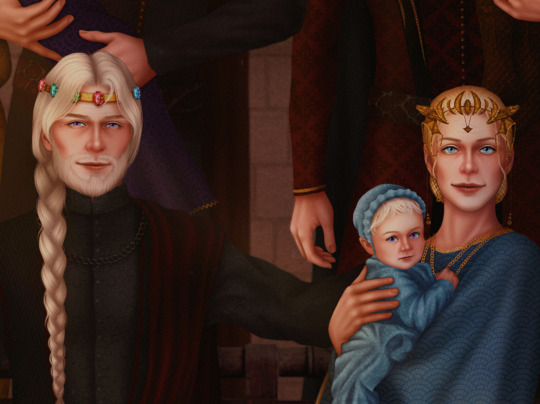

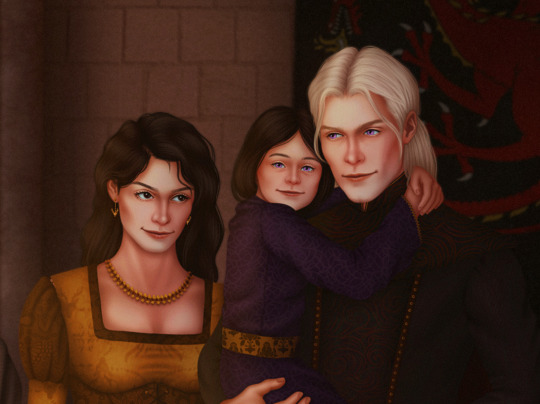

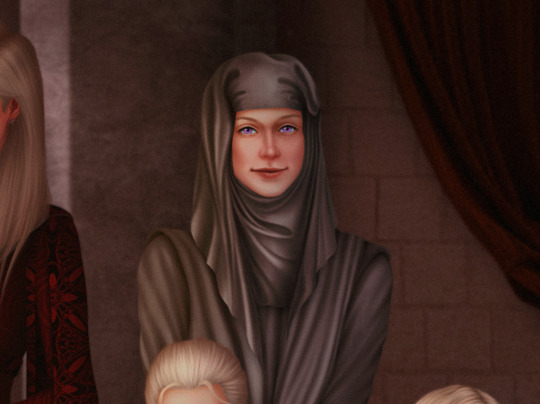

81 AC
King Jaehaerys I Targaryen also known as “The Conciliator”, “The Wise” or “The Old King” with his wife “Good Queen” Alysanne Targaryen and their children (left to right): princess Daella, prince Vaegon, crown prince Aemon with his wife Jocelyn Baratheon and daughter Rhaenys, prince Baelon with his wife Alyssa and son Viserys, princess Maegelle, princess Saera and princess Viserra. The Queen holds princess Gael or “Winter Child”
Upd: Damn, drawing 14 people in my style is just- …wild. Took a month and a half 💀
#house of the dragon#asoiaf art#asoiaf#game of thrones#targaryensource#fire and blood#jaehaerys i targaryen#alysanne targaryen#aemon targaryen#jocelyn baratheon#rhaenys targaryen#baelon targaryen#alyssa targaryen#viserys targaryen#maegelle targaryen#vaegon targaryen#daella targaryen#saera targaryen#viserra targaryen#daemon targaryen#gael targaryen
568 notes
·
View notes
Text
TG stans trying to use Andal law to justify Aegon’s claim to the throne: don’t bother.
Andal law states that a daughter comes before an uncle.
So…
Why was Aerea passed over for Jaehaerys?
Why was Rhaenys passed over for Baelon?
Why was Rhaenyra passed over for Daemon?
The only tradition I see here is the one where legitimate female heirs are passed over in favor of their uncles simply because they are women.
And just because the Targaryens converted to the Faith, that doesn’t mean that Andal law applies to them fully. There have been many situations where the Targaryens have been ‘excused’ so to speak.
Aegon the Conqueror was permitted to be married to Visenya and Rhaenys at the same time. The law against polygamy was overlooked this time. And just because the Targaryens decided not to practice it later on (possibly so as to not start another conflict with the Faith), that doesn’t mean that they couldn’t do it. They could have continued to do it and they would have gotten away with it. Why? Because they have dragons. Dragons = power.
Then there’s the law of exceptionalism which allows Targaryens to marry within the family. Another exception.
All in all, basing Aegon’s claim on tradition and Andal law is not helping his cause one bit. Because neither tradition nor Andal law had been 100% respected since the Conquest.
On the other hand, Rhaenyra’s claim is based on a royal decree and the oaths swore to her by the Lords of the Realm (which actually mean something). Where there is no specific law of succession when it comes to the Iron Throne, the King’s word is what matters.
So yes, Viserys had every legal right to make Rhaenyra, his firstborn child, his heir. Because the King’s word is law. It’s one of those situations where you have a certain amount of power but certain people (like Council members) expect you not to use it. Viserys did, and it caught everyone off guard. His decision was perfectly legit but didn’t fit with the traditional misogynistic mentality, not to mention with the ambitions of the Hightower upstarts.
I have heard plenty of people state that a King has to abide by the laws of the Realm and he cannot do whatever he wants.
Well, if that’s the case, then Jaehaerys should have been obliged by Andal law to make Rhaenys his heir after Prince Aemon died. But he didn’t. Because it would have put into question his own claim to the throne. So, he picked his other son, Prince Baelon.
Queen Alysanne knew the laws well, which is why she supported Rhaenys (not because of some “girl power” desire). She knew that according to tradition and law, Rhaenys was the rightful heir.
The rules are altered, respected or ignored whenever it suits the patriarchy. This is precisely what GRRM has been trying to convey.
Alicent’s son is not the rightful heir. His ascension was the consequence of Hightower ambition, sustained by certain Council members who would rather have a usurper on the throne than a legitimate ruler who is a woman.
One of the things that I love about the story of the Dance is that despite the patriarchy going strong, we still see that mentality is changing, hence how Rhaenyra had the most supporters (53 Houses). The Hightowers expected to take the throne easily with the support of the entire Realm, because they were convinced that no one would S choose a Queen over a King. They thought wrong.
#team black#pro team black#rhaenyra targaryen#anti aegon ii targaryen#anti aegon ii#anti aegon ii stans#asoiaf#asoiaf meta#the dragon queen#queen rhaenyra#rhaenyra i#house of the dragon#hotd#anti team green#jaehaerys i targaryen#viserys i targaryen#good queen alysanne
83 notes
·
View notes